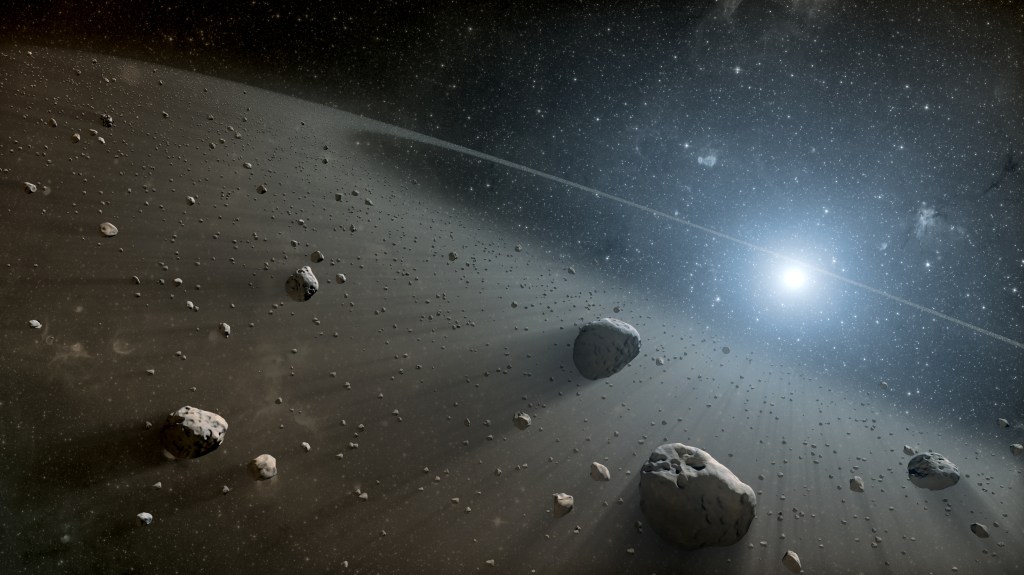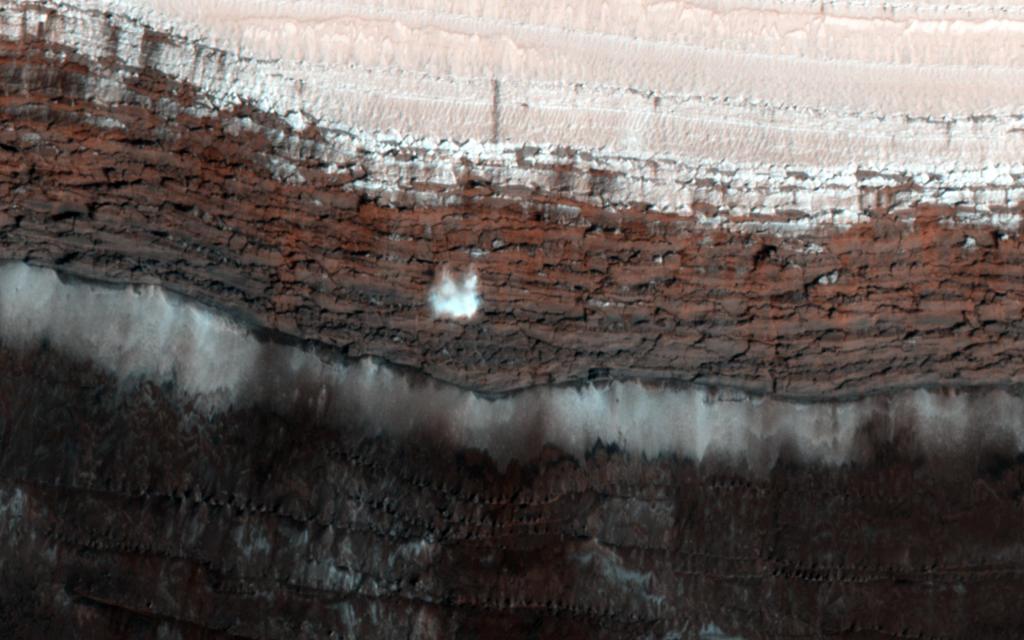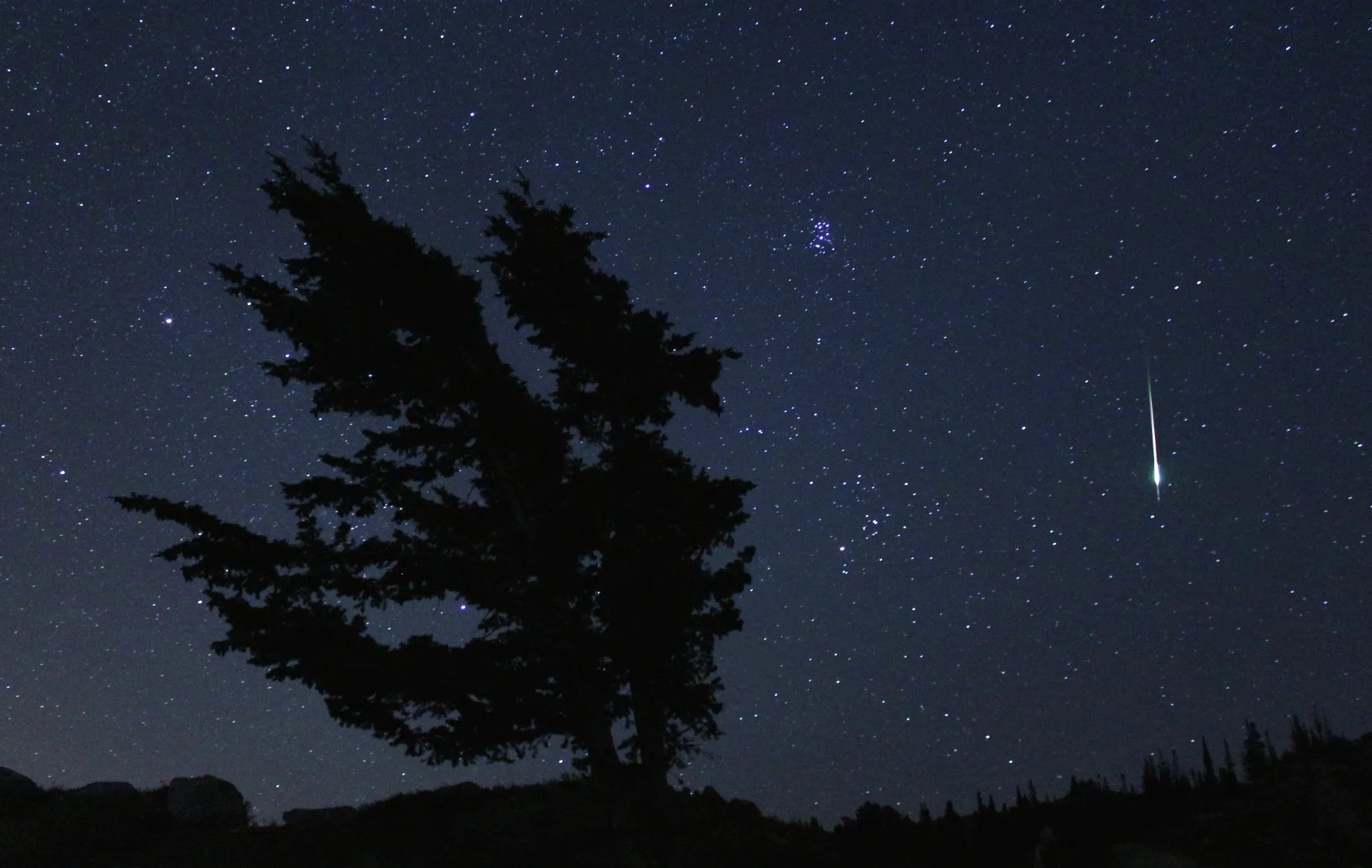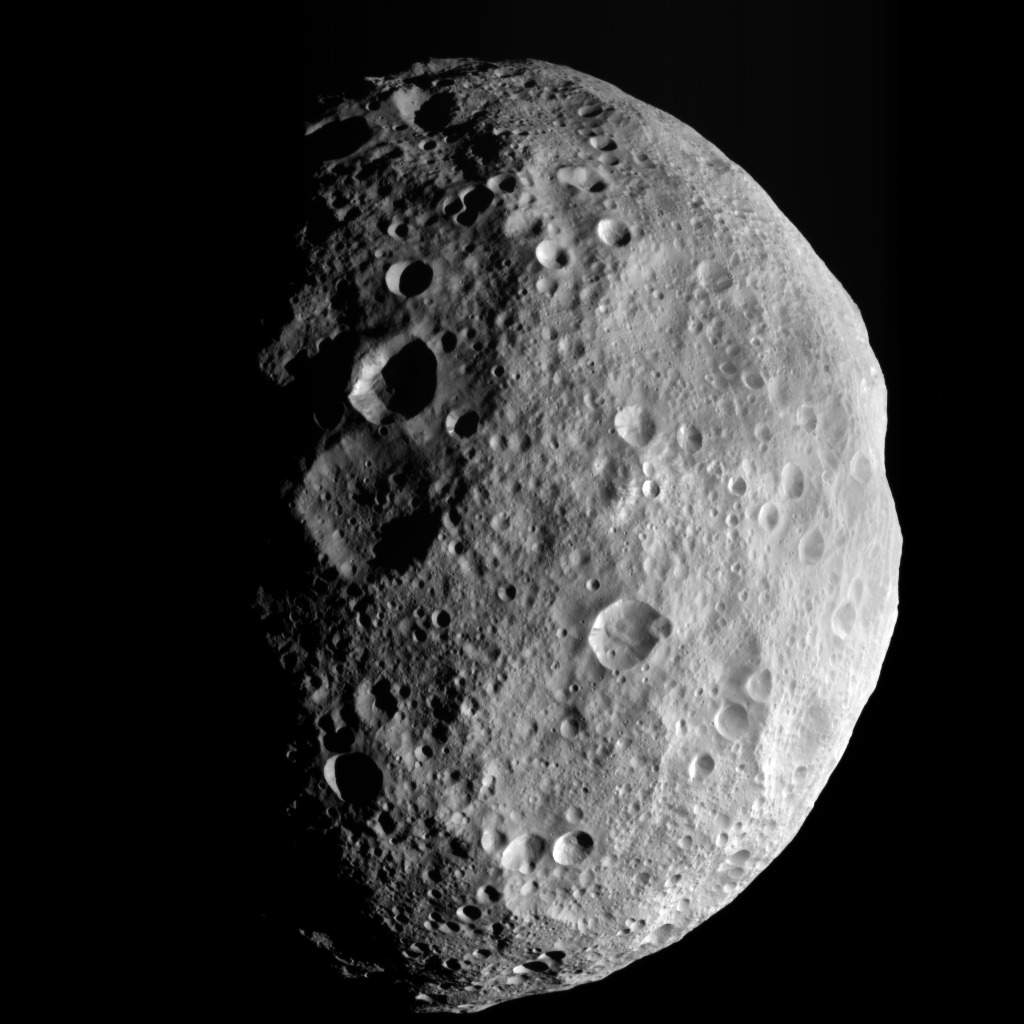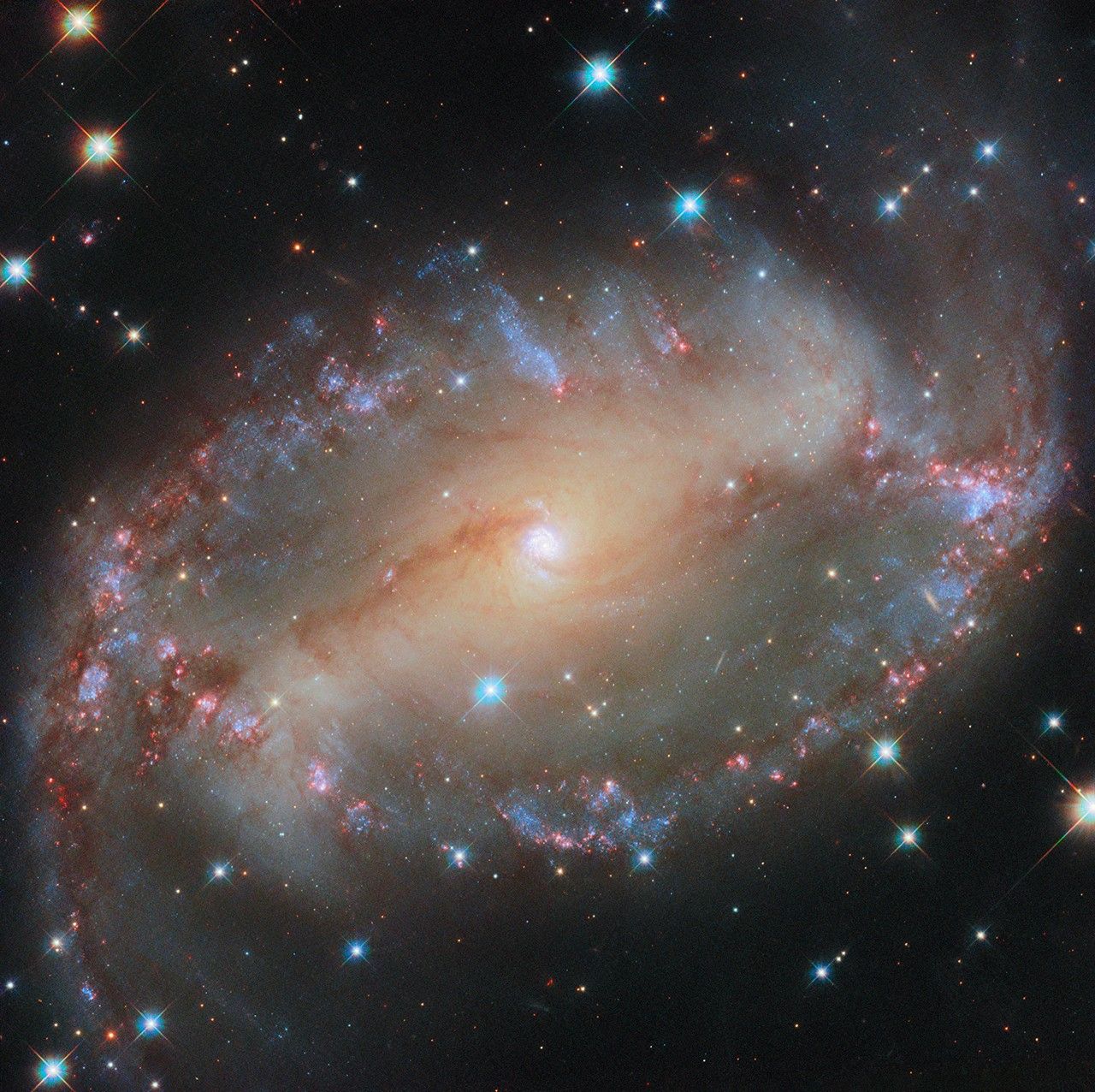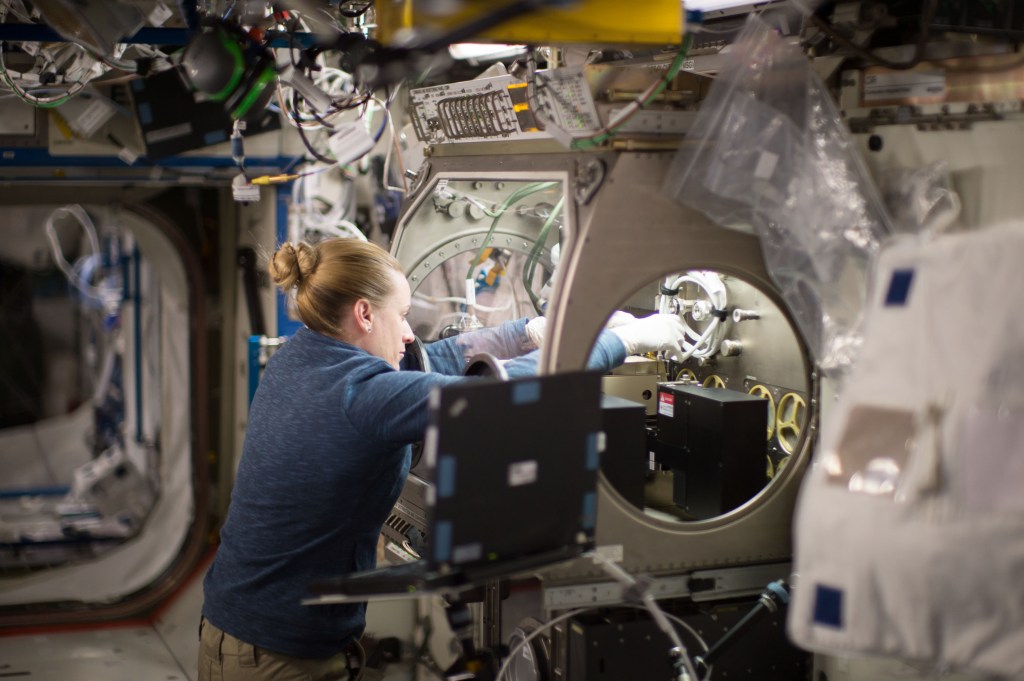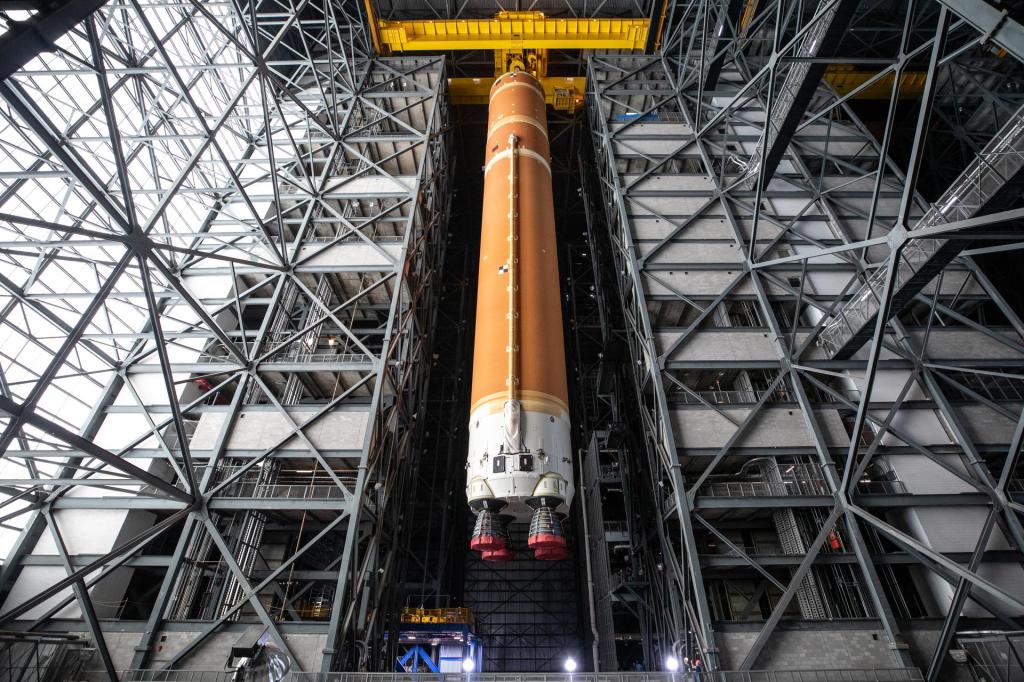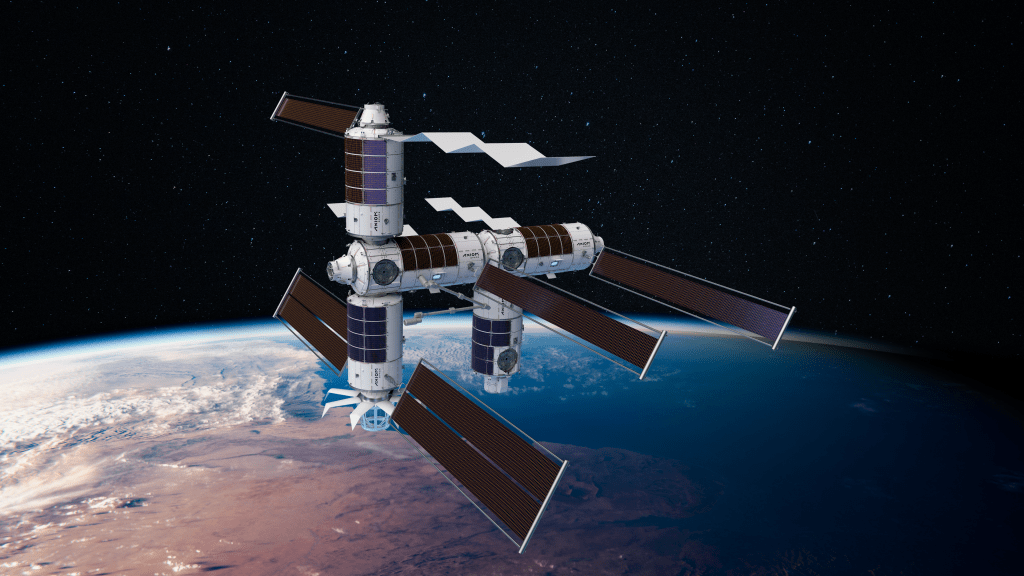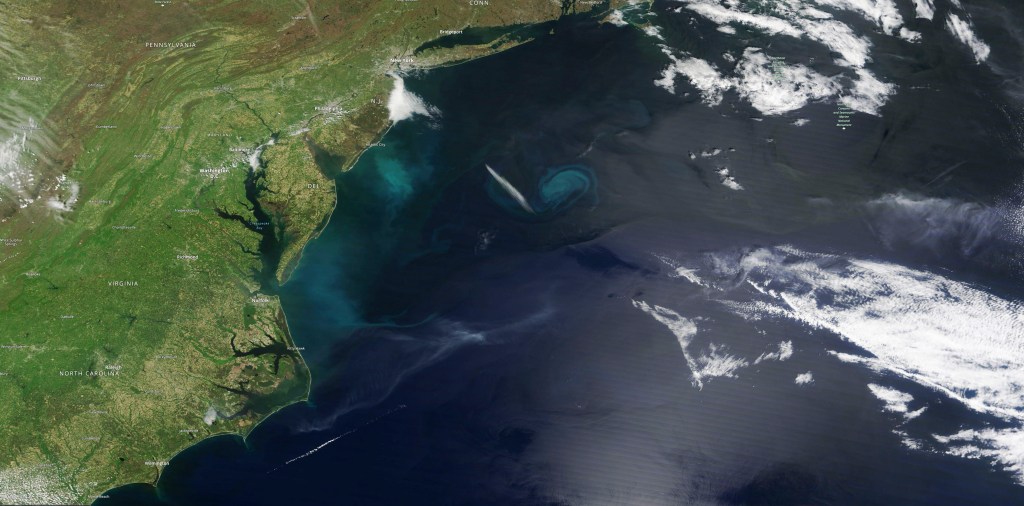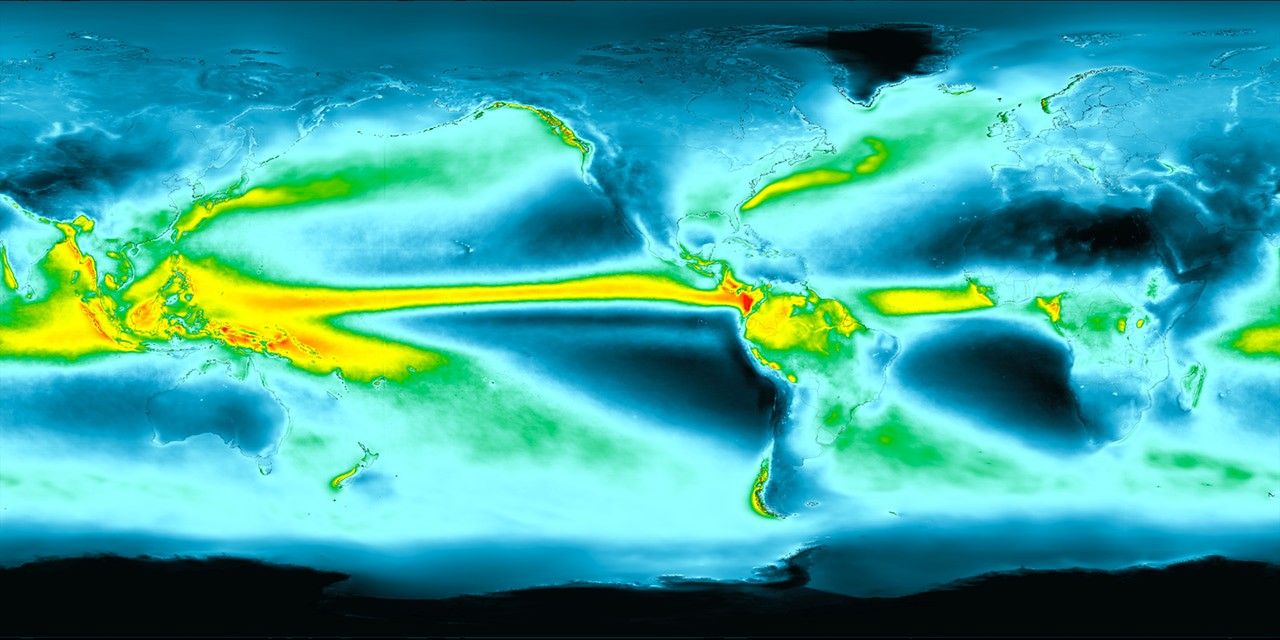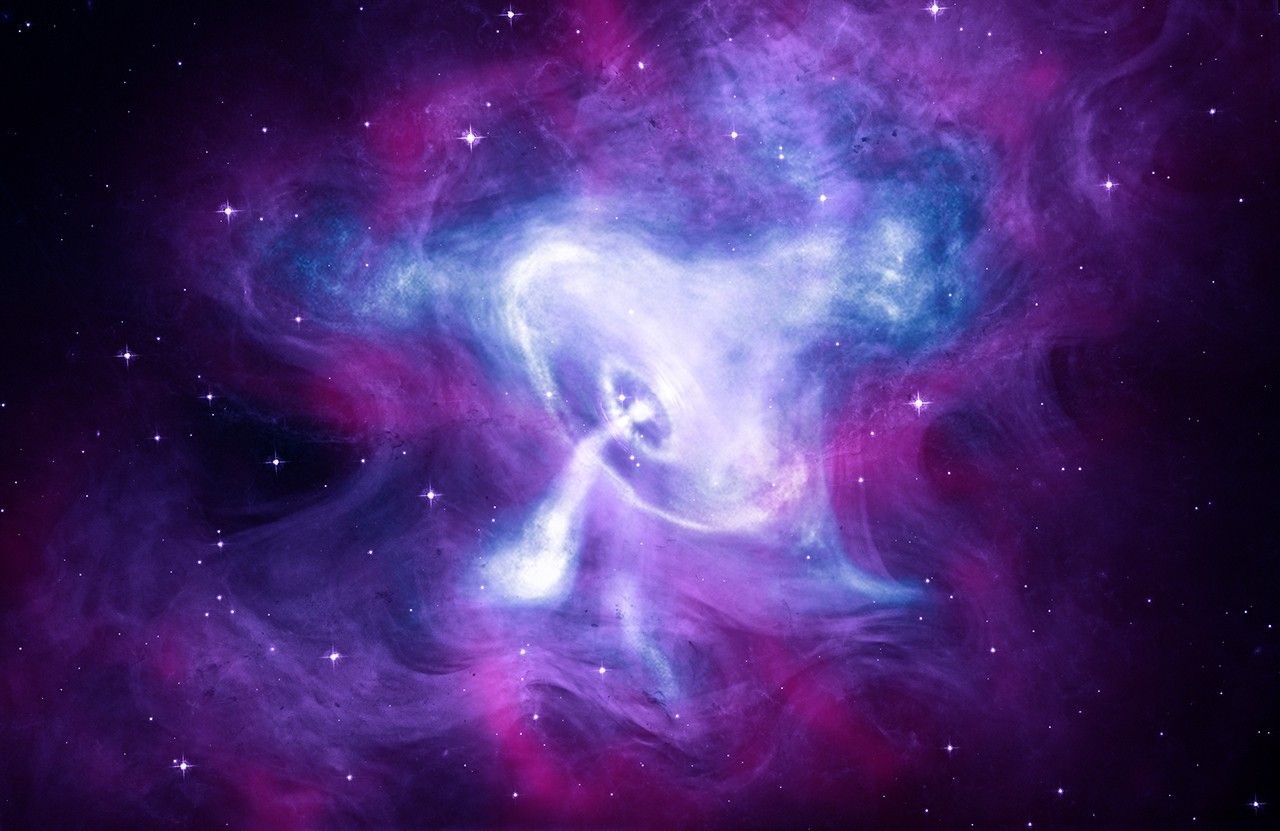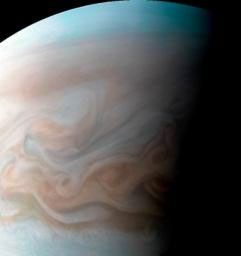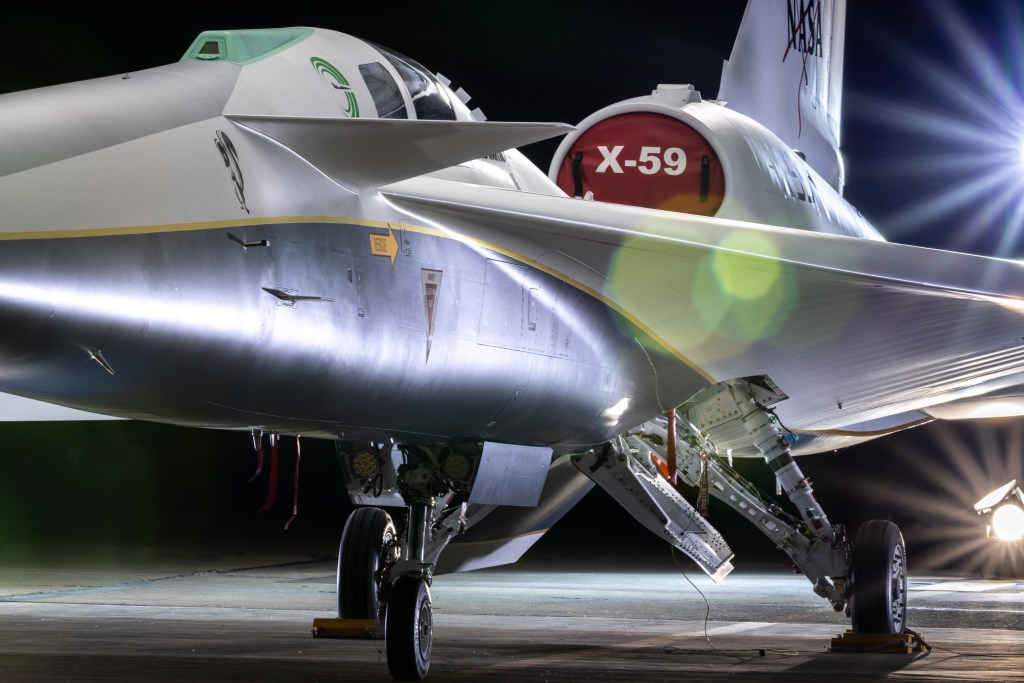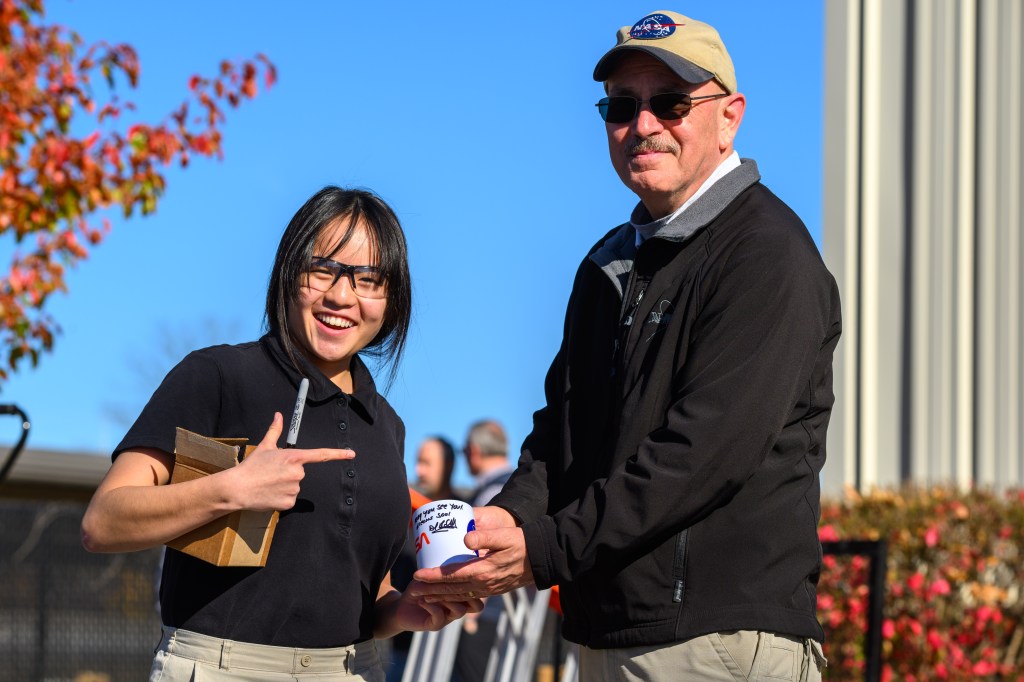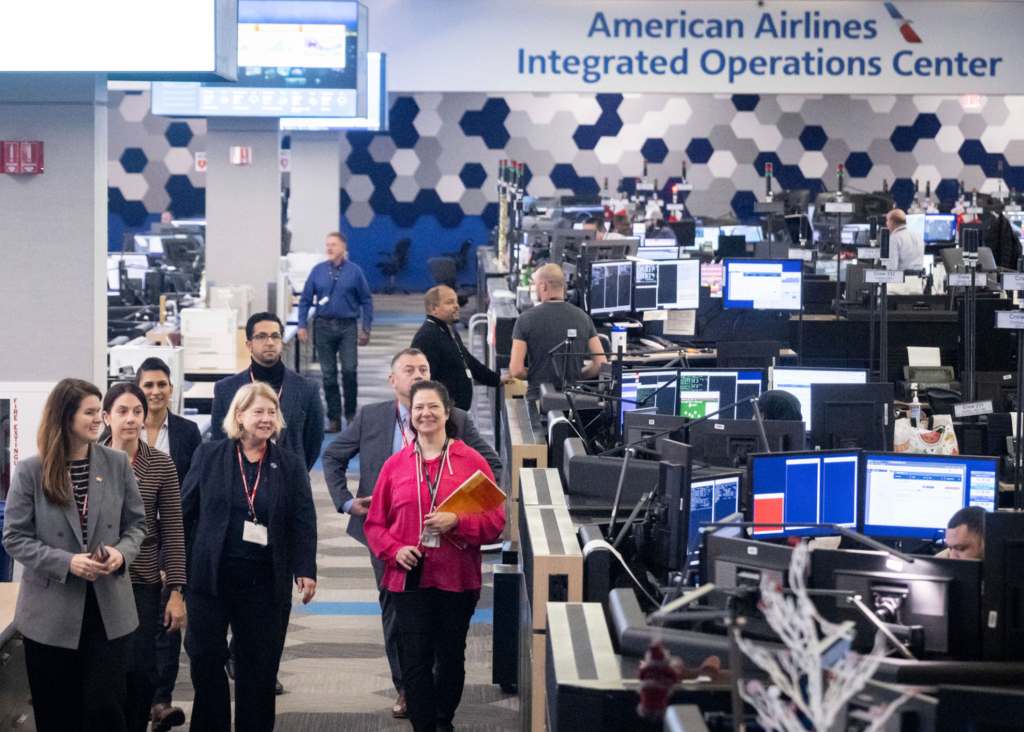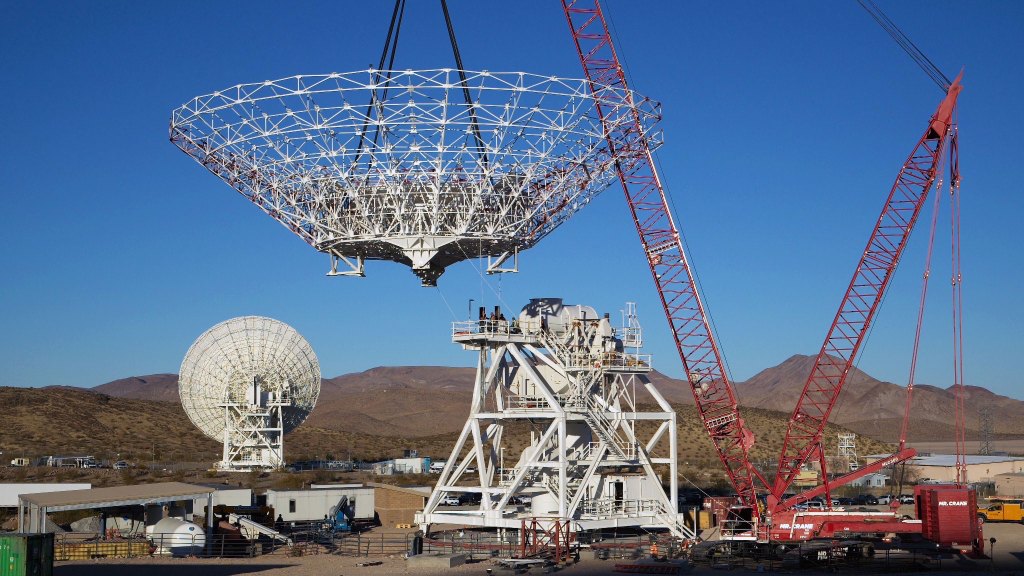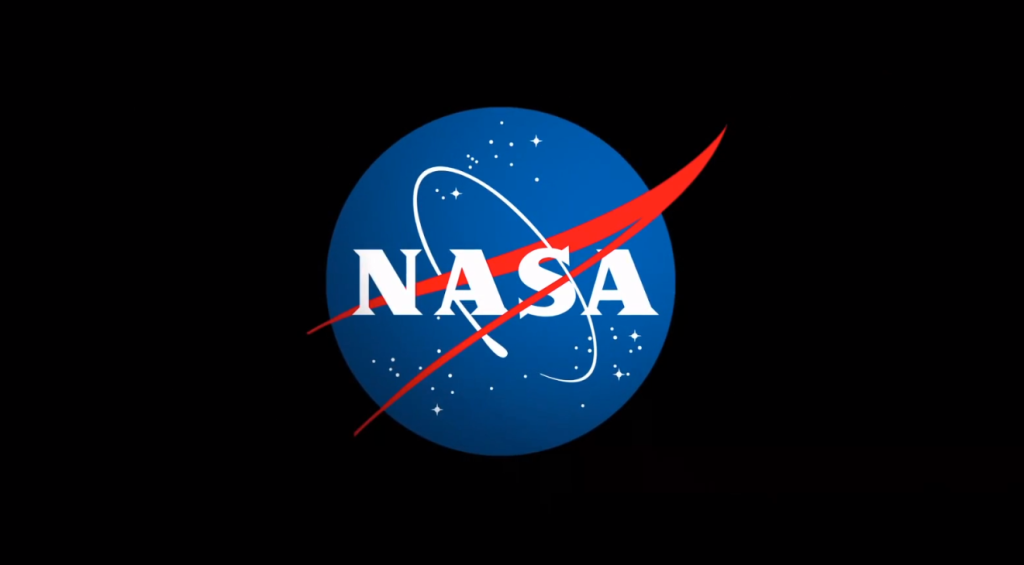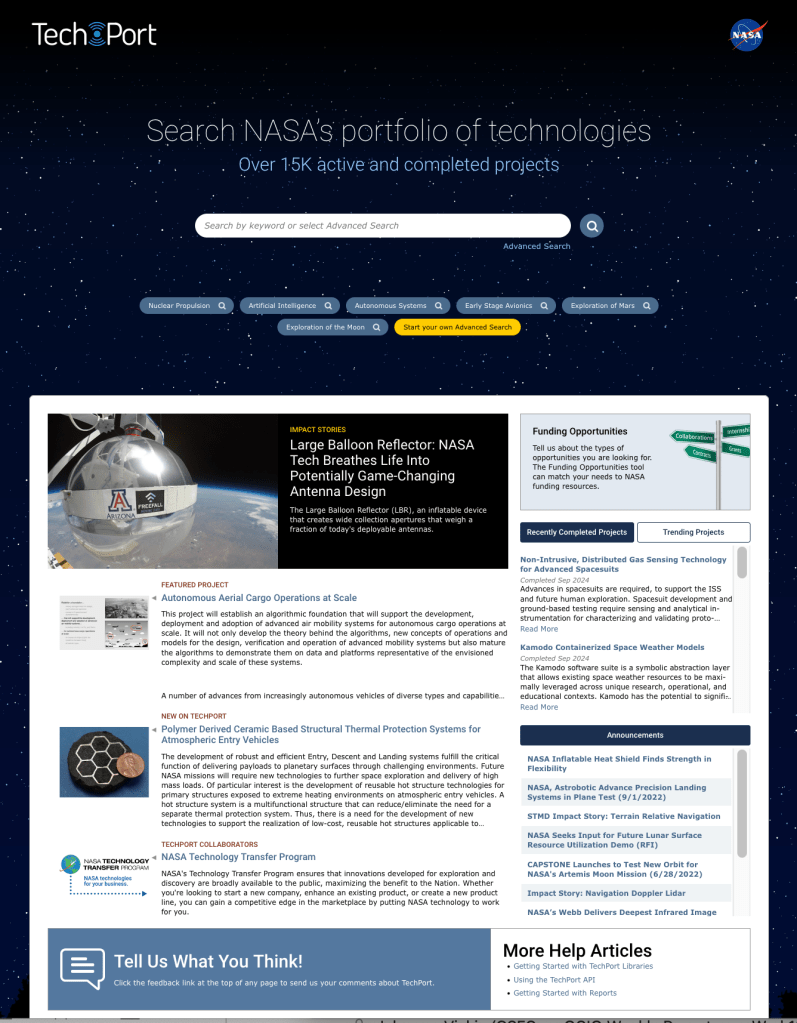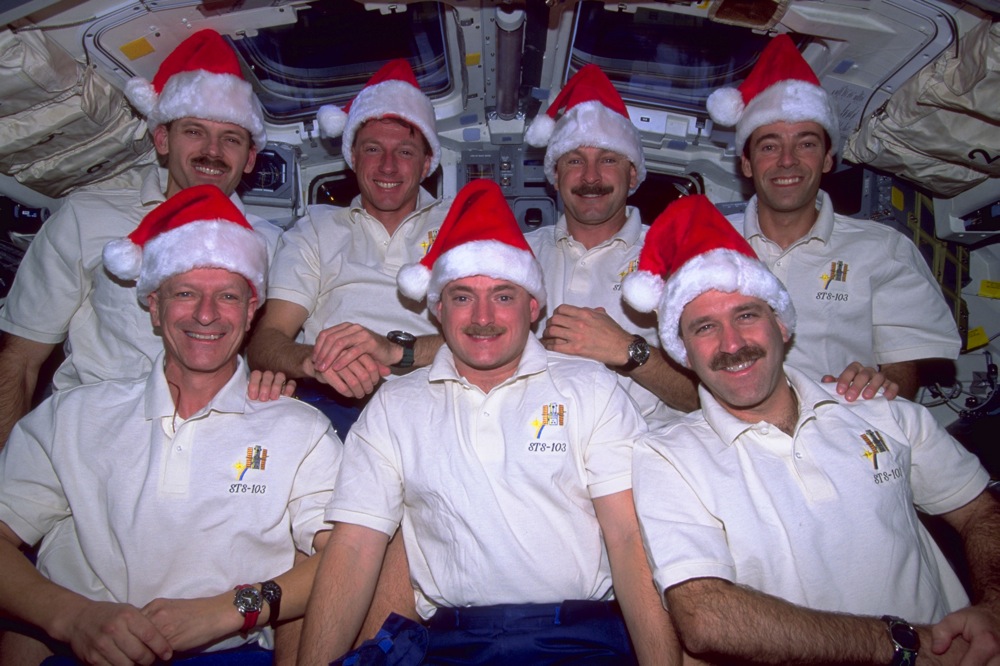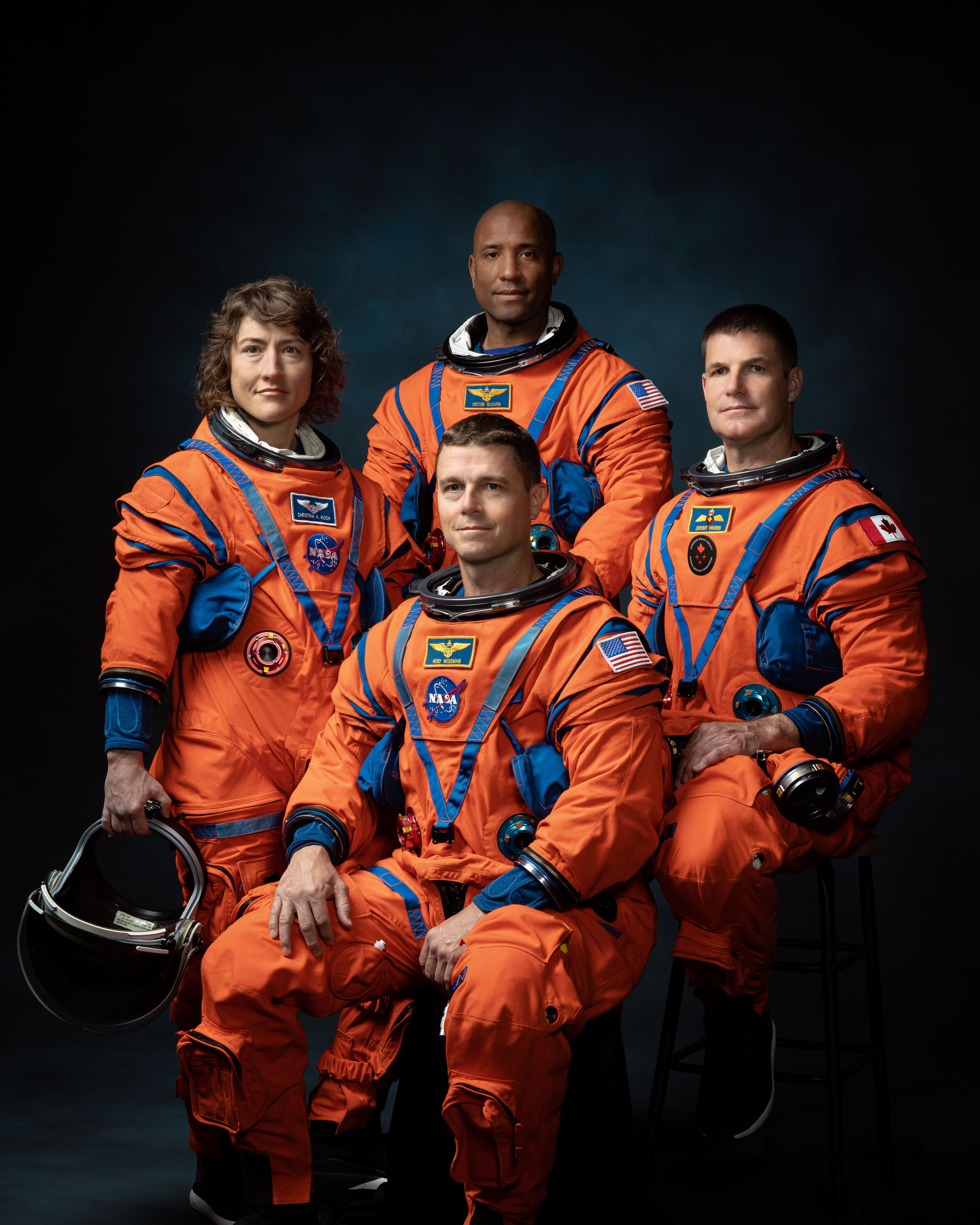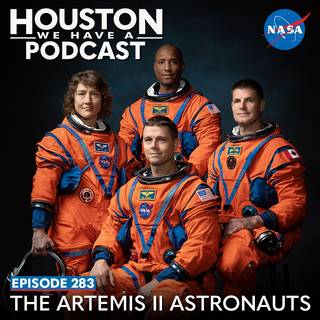
From Earth orbit to the Moon and Mars, explore the world of human spaceflight with NASA each week on the official podcast of the Johnson Space Center in Houston, Texas. Listen to in-depth conversations with the astronauts, scientists and engineers who make it possible.
On Episode 283, the Artemis II astronauts discuss their past, present, and what they are looking forward to on their future mission to the Moon. These interviews were recorded in March 2023.
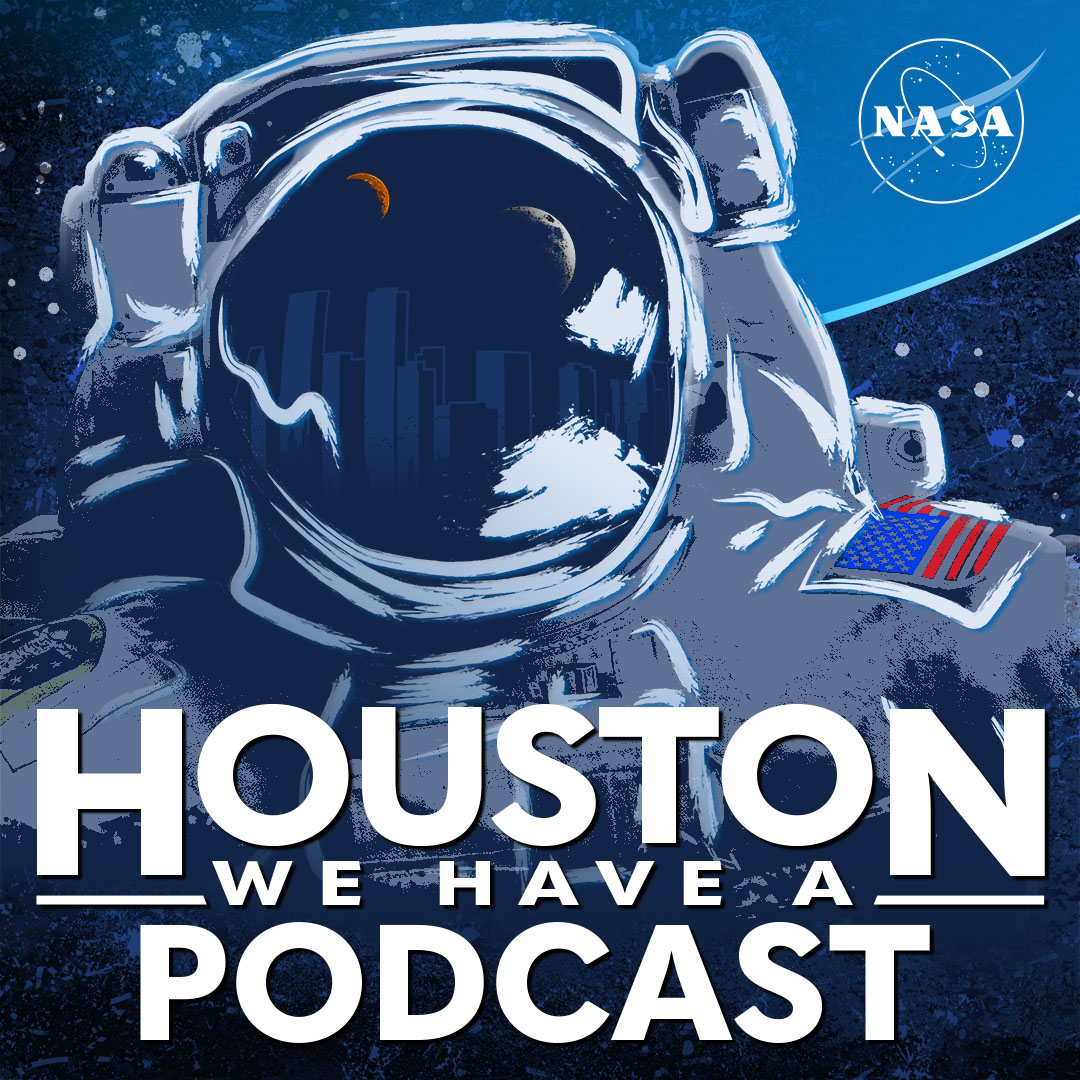
Transcript
Gary Jordan (Host): Houston, we have a podcast! Welcome to the official podcast of the NASA Johnson Space Center, Episode 283, “The Artemis II Astronauts.” I’m Gary Jordan, I’ll be your host today. On this podcast we’re bringing the experts, scientists, engineers, astronauts, all to let you know what’s going on in the world of human spaceflight and more. NASA just named the crew that will be flying to the Moon as part of the Artemis II mission. Artemis II is a flight test of the Space Launch System and Orion spacecraft around the Moon to verify today’s capabilities for humans to explore deep space. After the uncrewed Artemis I mission, which tested the Space Launch System on its first flight and pushed Orion to its limit, verifying some of its most critical systems, we are on the path to taking that next step. I was super-fortunate to get a chance to spend some time with these individuals for this podcast. And let me tell you, these are some exceptional people. The Artemis II crew revealed to the world is Commander Reid Wiseman, Pilot Victor Glover, and Mission Specialists Christina Koch and Jeremy Hansen. Each of the four crew members reflect on this incredible privilege to get selected for such a mission, share stories that define their path to get to this moment, and reveal what Artemis and exploration means to them. So let’s get into it; enjoy.
[Music]
Host: First up is NASA astronaut Reid Wiseman, Artemis II commander. He grew up in Maryland and went to RPI (Rensselaer Polytechnic Institute) in New York for a bachelor’s in computer and systems engineering before becoming a naval aviator. Reid was assigned to a fighter squadron and deployed to the Middle East before being selected as a U.S. naval test pilot in 2003. He later went back to school for a master’s in systems engineering from Johns Hopkins and a certificate of space systems from the U.S. Naval post-graduate school before being selected as an astronaut in 2009. As a NASA astronaut, he flew aboard a Russian Soyuz to the International Space Station and spent 165 days in space in 2014 conducting science investigations and completing two spacewalks. Reid recently served as the chief of the Astronaut Office prior to his selection for Artemis II. A true leader; here’s a little bit more about Reid Wiseman.
Host: Reid Wiseman, thank you so much for coming on Houston We Have a Podcast today.
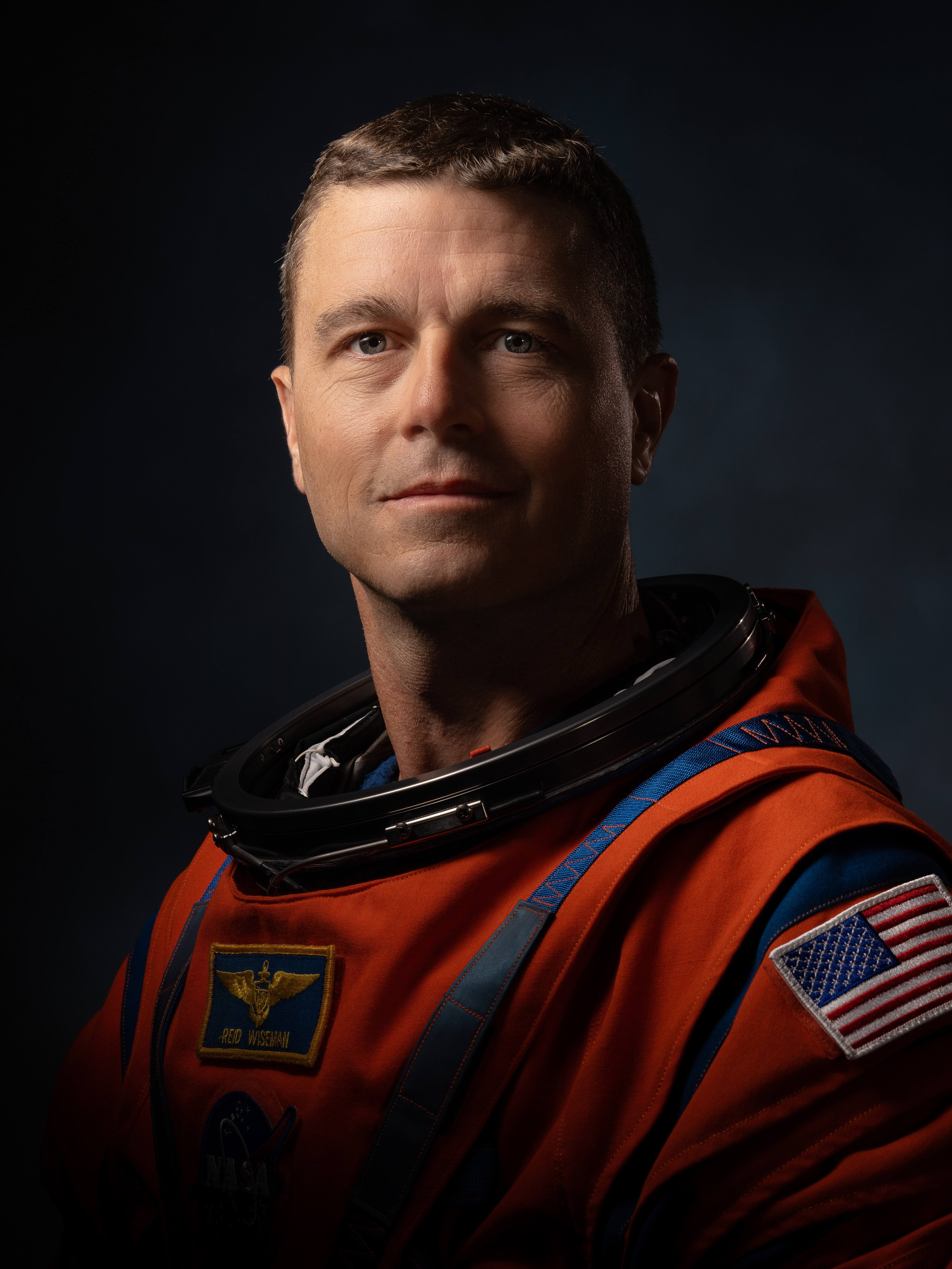
Reid Wiseman: You bet.
Host: All right. Pretty exciting stuff. You are going to be on the Artemis II mission. Tell me some of your initial thoughts when you found that out?
Reid Wiseman: The initial thought that you always want to know is who’s on the mission with us, and I am incredibly lucky because I have Victor Glover, Christina Koch, and Jeremy Hansen, three of the finest human beings and outstanding astronauts that I’ve ever met.
Host: That’s huge, right? I mean, you got to know the Astronaut Corps pretty intimately as the chief of the Astronaut [Office] with a huge responsibility, right? But I think with that, you got to know everybody’s skills, everybody’s capabilities, and so you look at the three that you’re going to be traveling with, you seem very confident that these are the right folks.
Reid Wiseman: Very confident. And I do have to say the, the Astronaut Office, everyone has their own strengths.
Host: Yeah.
Reid Wiseman: But across the board right now, it is a team-focused, get the job done group of individuals. It is a really fantastic group of folks right now.
Host: You know, I want to kind of take a step back and talk about you and get to know you as a person. You grew up in Maryland, and there was maybe this influence of the military really close — you got Annapolis and, and — but I wonder if, if it was maybe that proximity or maybe something else that sort of sparked your interest to pursue aviation to, to go, you know, to the Navy? What, what was that initial, what, what was your childhood like that sort of led you down that path?
Reid Wiseman: Well, first I have to say, Maryland is a beautiful state. And you don’t really realize it until you move away. But that is a beautiful place to grow up. And I love going back and, and visit in my old hometown. But the, for sure, the most clear memory I have that sparked that aviation military interest was, we lived fairly close to a small, I think it was an Air National Guard airfield — Martin, Martin State, I think it was called. But A-10s from the Air Force would fly over, maybe once or twice a week. And as a kid looking up at that, like that was just, ah, it was like, I loved, it was getting the adrenaline going. And then, definitely Annapolis is close by. My brother went there, I went to a Blue Angel flight demonstration down there for a graduation, and that is one of the coolest things you could ever see. So those things started to, to build on my desire to be in the military. And I looked a lot at the Air Force and the Navy, and decided that I wanted to be on a ship at sea, and I wanted to experience that, and what that felt like.
Host: It translates pretty nicely, I think, right, being on a ship at sea to maybe, you know, being in space. It’s maybe a slightly tighter quarters, but I think those skills translate very nicely. And I wonder if maybe during your time in the Navy or even before you were even considering at what point you started considering that astronaut was a reality?
Reid Wiseman: Oh, you never consider that astronaut is a reality until you get selected. I think everyone goes into that with it as a dream, and you want to take that shot at fulfilling that dream. There was never a minute in my life that I thought I’d be selected to be an astronaut. That was just not even possible. Even after going through two rounds of interviews in 2009, you still just look at it as such a, such an improbability that you just, you want it and you go for it, and if you get it that’s awesome. And if you don’t get it you got a great life. So I loved being a pilot in the Navy. I loved showing up to work every single day. I liked the people I worked with. I liked the mission we were doing. And so if I hadn’t come to NASA I would’ve woken up sad for a few days, I’m sure, and then I would’ve been right back into it, because I had an awesome job before I came here.
Host: I think that’s important. I hear that a lot with the Astronaut Corps. They just loved what they do, and maybe that was what helped them to become astronauts in the first place. But just knowing that you just got to be passionate about whatever you’re in, I think that kind of is big. You know, you can’t just like be longing for astronaut, and then if you don’t get it, you’re just, you know, sad to your core. I think you just have to enjoy that.
Reid Wiseman: I agree. That, people get tired of the advice that most of us give when they say, “hey, how can I become an astronaut?”
Host: Yeah.
Reid Wiseman: And the, the standard response is the right one: find something you’re passionate about in life and do it as a career. And, and if you do that, then you are best setting yourself up to be an astronaut. And honestly, you’re best setting yourself up to be a successful, happy person.
Host: You did ultimately get a call, call though, and your call story to become an astronaut is, is pretty funny. Yeah; I, you were just telling it to us earlier, but I mean, it just seemed like it was just poor timing.
Reid Wiseman: So, my call story to become an astronaut came from Peggy Whitson, and it came in the form of an email. Peggy, amazing astronaut; she was running the selection board when I got selected, and I was deployed on an aircraft carrier in the Middle East, and so there was really no way to call into the ship. And so I got that email from Peggy, and Steve Lindsey, who was the chief astronaut at the time, he was cc’d on that email, and the only sentence that was written on there, it just said, “hey, please give one of us a call.” And that was like, I, when, when I read that email I was just like, numb to the core. And then the, the longer story of that is I go to try to call Peggy, and the ship went into general quarters, which meant they shut down all external communications so I had no way, I had no way to email, I had no way to call, and I didn’t, I wasn’t able to succeed in making that phone call to Peggy for about three or four hours. But when I did, it was all good. And, and the rest is history there.
Host: Amazing. You had a wonderful time, a wonderful career as an astronaut so far. Just, you’re, you’re flown, you’re experienced, and you have, you have this flight under your belt on a Soyuz up to the International Space Station, and you have this time of a long-duration expedition. Can you talk about the training that got you to, for that specific mission, what you were training for was, you know, of course you had the Soyuz training because you had to get a ride up and back, but of course the idea of training for the International Space Station, and when you went into that, there were years of, of, you know, fine-tuning of the training process to allow for, you know, astronauts to be as successful as possible. When you reflect on that, what are some of the highlights of training?
Reid Wiseman: The first thing that I, that I reflect on in training for a long-duration mission is you very quickly realize that it takes a huge team to successfully operate the International Space Station. So when you’re in training, you know you are relying fundamentally on Mission Control. And we have mission control centers around the world for the different partners that are involved in that. But there’s no way one human being can know all of the systems, the environmental control systems, the external thermal systems, the payload systems. And so, you go into that training thinking you’re going to master all of this, and you really quickly realize, OK, here’s what I need to do in this training: I need to know how to take care of myself, and I need to know how to be a good crewmate. So you are learning from day one, you’re really focused on what are the payloads I’m going to operate on, and then you’re really focused on what are the emergency procedures and how am I going to keep myself safe if something bad goes on? And that is where you focus the bulk of your time with your crewmates. Definitely need some crew bonding time so that you know these people that you’re flying in space with. And that’s very, very valuable. And then when you have those sorts of, of things wired and, and you’re seamless on those, those executions of emergency procedures, it’s pretty much time to go fly.
Host: There is an interesting mix of all the different pieces that you have to know. There is that technical component of you have to understand how things work, how to turn, you know, how to get the water so you can eat your food. But then, you know, there’s also this interpersonal component that I think is, is really powerful, and especially in translating to, you know, Artemis II, to sustain lunar presence; we found this out through expedition missions that there are these things and, and the Astronaut Corps talks about them quite a bit, called “expeditionary skills.” And besides the technical thing that I think a lot of people think of when they think of astronaut — super-intelligent, you know, understands systems, the engineering component — but there’s this idea that you have to be a good team member. And you talked about that. You said you have be, learning about being a, a good crewmate. What are those skills?
Reid Wiseman: Scott Kelly put it best when he came back from his year in space and he said, look, I think every astronaut should think that they’re doing, what he said was 51% of the work. You want to think that you’re doing just a tiny bit more work than, than, than you need to be doing. So if the trash can is full, you’re emptying the trash can. You’re not asking somebody else if it needs to be emptied, you’re just, you’re doing that for your crewmates. If you can tell somebody is hurting, you’re just taking that moment out of your day, even if your schedule is slammed, just to connect with them, ask them how they’re doing. Like I know those are really simple things, but they do really go a long way. And then, another side of it that you, you need to focus on is, yes, there is a commander on the mission, there’s a commander on the International Space Station, but at any given day there’s probably a thousand touch points where you’re either a follower or a leader in your day on the International Space Station. If you have the highest situational awareness, you take control of the situation. If you don’t, you look for your best way to be an active follower to empower the commander to get the job done, or the person who has the highest level of information at that time. So you’re just learning this, it’s this crazy flexibility that I really haven’t seen anywhere else that I’ve worked. It’s, it’s very neat. It’s very neat thing. You don’t even have to ask, you don’t have to talk to your crewmates about it, you just see — OK, today Alex Gerst, he’s doing this and he, he is just crushing it, he’s got the situational awareness, so if anything is going on he’s the guy who’s the point on that, and we’re all going to follow and we’re going to help him out.
Host: That leadership style, it seems like something that you see you’re very passionate about, that you want to implore. You’re, as the role of commander, you know, you’re, you can approach it, I think, in, in different ways. But it seems like you want to have that mix of, you know, being that resource, but then also pulling on the intelligence of the team. Is that, as you just described, is that sort of your approach to how you plan, maybe, to be a commander?
Reid Wiseman: Well, first, if you sit down and talk to Victor, Christina, and Jeremy, you’ll realize that there is some strong talent on this crew. So yes, I would love it if I could just sit back and help them in any way I can for us all, all four of us, and then all the teams on the ground, to accomplish this mission safely. That’s the end goal: take care of the people, and when the hardware is ready to fly, we go fly. And I think that is the strongest role a commander can bring to this.
Host: You, you talk a lot about responsibility, at least we, we just came from another recording and you were talking about this level of responsibility, and you were reflecting on your time as the chief of the Astronaut Office and, how you internalized that responsibility so strongly. I think your, your, your goal of what the threshold was for success was just so high. And, and because you wanted, you had, you took on the responsibility of taking care of all the astronauts. Can you describe kind of what that was like, as the chief of the Astronaut Office?
Reid Wiseman: There’s a lot of sleepless nights.
Host: Yeah.
Reid Wiseman: You, you, you do internalize a lot of it, and you want what is best for the team. You’re always looking what’s best for each individual, but at the end of the day you also need to know what’s best for the team, what’s best for the Astronaut Office, what is best for the international partnerships, the space station program managers. And that is a very, it’s a very challenging thing to balance. Sometimes you, you make decisions that you know that decision is not the best for the individual person, but that is the best decision for the entire program that is going on. Or there are other days where you know that somebody really needs your help and you’re making a decision for that personal per, person when you know it’s going to hurt the end goal of the International Space Station program manager. Just trying to balance all of that, and trying to look with the broadest lens possible, I think that’s a big challenge. Another thing that, that I hold very near and dear to my heart is, you, if you’re going to make a decision about a person, you have got to go talk to that person. You can never, ever, ever, for even one second, assume that you’re making the right decision on their behalf because you never are. People are complicated; people are complicated, emotional beings, and just sitting down and talking with someone for even ten minutes will shed new light on a problem that you’ve never thought of. So I am definitely a collaborator. I definitely want to talk to people. I want to try as hard as possible to make the decision as late as possible with the most amount of information.
Host: I think it’s this side of you that I think you’re trusted to be the commander of this mission. You have, you take on this responsibility so fully and, and you internalize it and, and it’s, it’s one of the top priorities. But you also, and we were talking about this earlier, you, like, you’re, you have a good crew and there to be a good crew, you got to have fun. And that is, that is something that I know is important, you know, on the International Space Station to, you talked about taking those moments to check up on someone, but to, you know, that, that crew, the idea of bonding as a crew, trusting each other and, and spending time with one another, that’s, I know that’s another side of you is you’re a fun guy. [Laughter]
Reid Wiseman: I definitely like to laugh. I like to have fun. I know there is a time where you need to be serious. I’ve had to learn that over time, because a, a good, a well-placed joke can pretty much break any ice…
Host: Yeah.
Reid Wiseman:…but you have to be careful with that sort of a mentality, especially in the environment that we work in: on the space station, off of the Earth, heading out to the Moon, you have to be careful with that.
Host: Sure.
Reid Wiseman: But one of our best sayings in the Astronaut Office is you want to land, every crew wants to land as friends. It doesn’t always happen, but that is the end goal. And there is no way you’re going to be friends with people if you don’t care about them, if you don’t struggle through the tough times with them, but if you don’t laugh through the fun times as well. And so, we have to take, we have to take time to enjoy some of our successes; we definitely have to laugh. We were, you know, just before we were in here I was sitting with Victor and Jeremy and Jeremy cracked this little joke. And I mean, we were laughing for five minutes, and it was just, it was perfect, you know? We, we got a really strong crew, very personable crew. And I, I think it’s just going to be, it’s going to be just a great time.
Host: [Laughter] I’m so, feel so lucky I get to talk to you guys because I absolutely picking up on it, just, the camaraderie is very, is very powerful. And especially the fact of, if I don’t know this, you know, you might be sort of still processing this, but I, you know, through watching different films about Apollo, through reading about it, I sometimes try to imagine myself in this tiny little space capsule, you know, with just a couple of guys and we’re going around the Moon. It’s, it’s tight, you know, but it’s just, there’s this moment of awe that you can, I feel like when you’re, at least when you’re watching a movie that you can take, and it’s kind of balancing that with, from what I hear whenever I interview astronauts, the sense of responsibility and focus and what’s the next step, when’s the next burn, you know? And I feel like, you know, you have to balance all of this in this tight space: the interpersonal stuff, the knowledge of the systems. But it’s, you’re, it seems like you have high confidence that you’ll be able to work on that balance over the next, you know, however long it’s going to take the train.
Reid Wiseman: I know for certain we’ll be able to work on that balance. I also know when I rode a Soyuz to low-Earth orbit and the engines cut out and I got my first look outside at Earth, and I also remember just being, I gasped; I couldn’t even process that beauty. I had looked at thousands of pictures of Earth from space, but when you see it with those human eyes, it is a totally different view. And if you think that the Artemis II crew is going on this mission, flying around the Moon on a free return and coming back, and we aren’t going to take a few minutes to pause and look at our Earth and our Moon from a perspective that very few have, you’re wrong. I mean, that is, it’s an integral part of this mission: that’s why we’re sending humans to use our eyes, our brains, to look at this project, this Artemis program, and, and make it successful.
Host: You speak very, you speak very passionately about…I remember we did — what was it we did? We did the Artemis I media day together, not too, not too long ago. We were trying to get everybody excited about, about Artemis I, about the first, we’re talking about Artemis II but you came and talk, told the perspective from the Astronaut Corps and the things that you were doing already to prepare for the mission. But one thing that was sort of central in what you were talking about was Mars. You are thinking way ahead. You know, we’re, we’re, we’re thinking Artemis and Moon, and this is what we’re talking about, right? But I think you, you put into such, into, you’re able to characterize why we’re doing this so well with the Moon and, and going farther. And I feel like as a person who, who gets to make the trip, it’s very powerful to hear from you as to why we are doing this, why we are exploring the Moon, why we’re pushing ourselves to get to Mars. It’s, it’s something I feel like is something you truly believe in, that it’s like a, it’s, you know, we, we have to go, we have to explore.
Reid Wiseman: If I was to be completely honest with you, I wouldn’t stop at Mars, I would be on the moons of Jupiter, out to Saturn. Like, there, there is so much for us to go see. I love that the James Webb Space Telescope is up there, I love what it is doing. I loved what Hubble did. I love seeing the rovers on Mars. I love knowing there are probes that are outside of our solar system. I love that we can look at almost any planet in our solar system right now, fairly up close from, from NASA missions. And I do very passionately speak to humans on Mars because that is, if you look out at our solar system that is truly our first destination. We’re going to, we’ve, we’ve, we’ve nailed working in low-Earth orbit, we know how to do it on the International Space Station; we’re handing that over to the commercial sector here, probably around 2030. We have to learn how to work sustainably on the Moon because we have to know how to operate on another planetary body like the Moon, and then it is onto Mars and setting up colonization of Mars. To me it’s, it’s just cool on every level. There’s, there’s geology we need to learn, there’s history of Earth that we can learn from going to Mars. We can find water; we can learn how to mine. We, there’s so many technical, scientific things that we will learn when we go there. But then there’s also that human imagination of being on Mars. Like, how many times do you look outside and look at Mars? You can see it at night with your eyes. Imagine being on Mars looking out and going, there’s my seven billion friends right there on, on that little blue dot. Like, I mean, that is just fascinating to me. It captures my imagination whenever I think about it. So why would we ever stop exploring, that is what humans do best. That’s what we’re built for.
Host: It’s awesome. You can imagine yourself on the surface of Mars, you can put yourself there. I mean, it helps that we’ve sent Curiosity and all these other rovers. I remember Curiosity that took that high-resolution panorama and we saw that blue dot.
Reid Wiseman: Ah, kill me, right? It’s just amazing.
Host: What a powerful image. Yeah. [Laughter] Now you, you can not only imagine yourself swinging around the back end of the Moon and seeing an Earthrise, but you get to experience it. I don’t know if you’ve sort of sat with that for a moment, maybe gone back and looked at Apollo 8’s when they did sort of the same thing and be like, oh my gosh, that’s like, we’re going to get to do that. You know, the next generation of students, teachers gets to experience this level of excitement. And I’m a part of it.
Reid Wiseman: It is, it’s humbling. It’s awesome. It’s amazing to be a part of it. I also, I think it’s going to be really neat to explore, this is going to be a little cheesy, but I think it’s going to be really neat to explore this in the digital age that we’re in.
Host: Yeah.
Reid Wiseman: I, I wish that when Neil [Armstrong] and Buzz [Aldrin] had stepped on the Moon on Apollo 11, that we had social media and you know, we had cameras on our phones that could record, and better than any camera that existed back then for the most part, just to be able to share this experience will be awesome. At the same time, I definitely need to highlight, this is not Apollo, you know; when we go out on Artemis II, we’re not going into low lunar orbit — we’re going about, you know, upwards of 8,000 nautical miles on the far side of the Moon. We are going to see something that is totally different than an Earthrise from a low lunar orbit. What we are going to see is going to look different. We’re going to look through the Moon at the Earth. I, I think it’s just going to be a truly magical moment for these four humans. And I hope we have the ability to share that. We saw a lot of that on Artemis I with the solar array cameras. I, I kind of went over to Mission Control and got stuck over there for about three hours because I couldn’t leave the, the screens, it was just so beautiful. So to get to do that with human eyes and to look at the far side of the Moon and pick out a few craters that, that, I just think it’ll be, it’ll be amazing.
Host: [Laughter] I, I feel very lucky to have had the chance to talk with you today, Reid. It’s, it’s, it’s going to be an interesting ride over these next couple months, just the excitement is just going to explode, I think. And, for, I, I think the passion that you bring to this mission and to exploration, I, I feel like a lot of people will connect with that. And I thank you. So, Reid Wiseman, thank you so much for spending this moment to, to let us, to get to know you and, and as the commander of the mission, definitely wishing you all the best. And congratulations.
Reid Wiseman: Thank you. And thank you to everyone who has a part in this because it is a vast, vast team across our nation and our planet, and we are really pumped to be the ones that are going.
Host: Next is NASA astronaut Victor Glover, Artemis II pilot. Victor was born in Pomona, California and received a bachelor’s in general engineering from Cal Poly (California Polytechnic State University, San Luis Obispo). He soon joined the Navy for advanced flight training and became a fighter pilot, then eventually a test pilot through an exchange program with the Air Force. Victor pursued several master’s degrees, was deployed again, and had an opportunity to work in D.C. with a U.S. senator before being selected as an astronaut in 2013. He flew aboard the SpaceX Dragon Resilience to the International Space Station in 2020 for a 168-day mission and participated in four spacewalks. He shared some incredible and inspiring stories with us that helped to get him where he is today. Here’s Victor Glover.
Host: Victor Glover, thank you so much for coming on Houston We Have a Podcast.
Victor Glover: Yeah. Awesome. Thanks for having me.
Host: Congratulations, sir. This is a big moment.
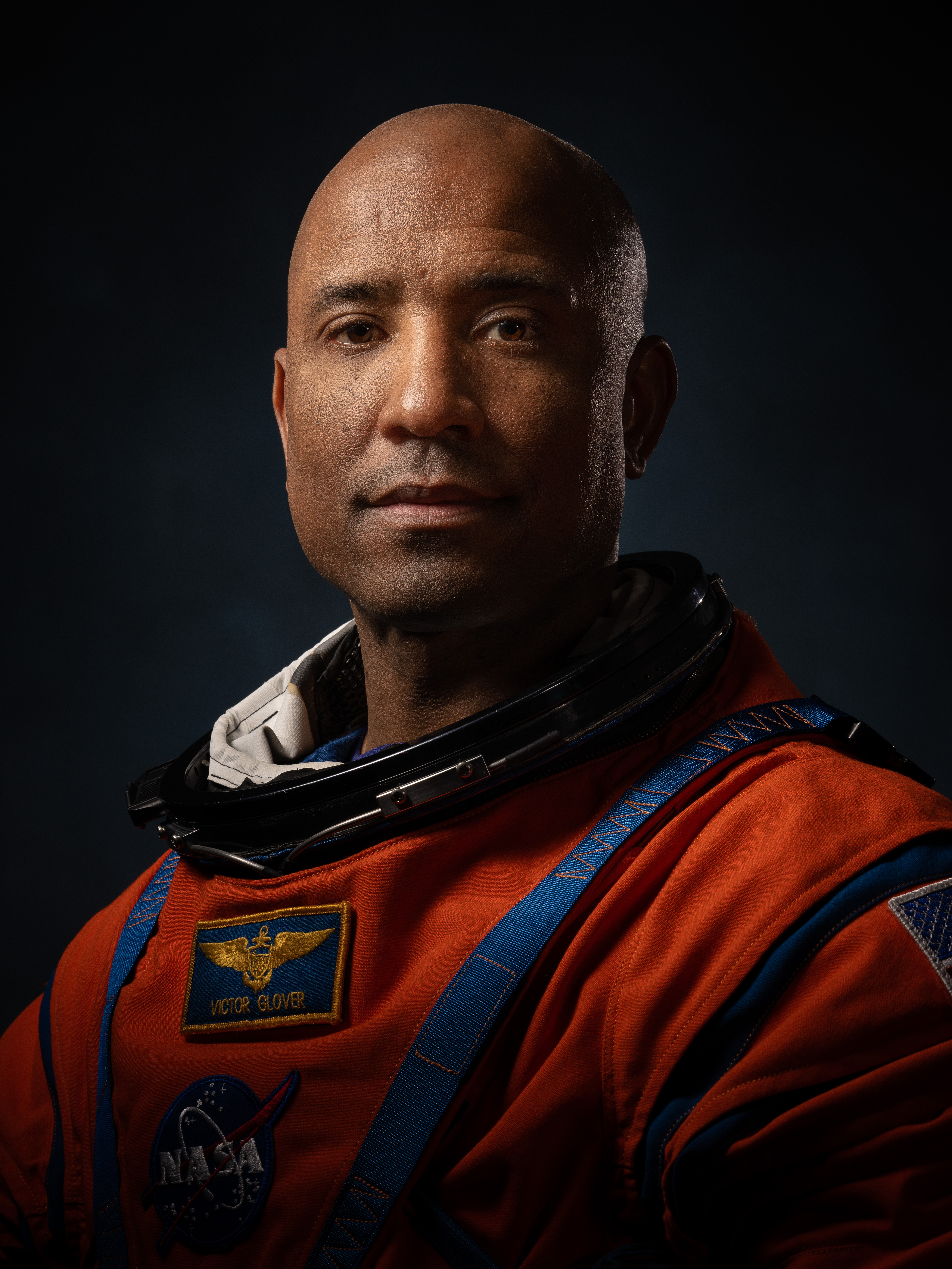
Victor Glover: Yes; yes, it is. Thank you, thank you.
Host: How, how do you feel?
Victor Glover: Shock. I mean, it is still shocking. It’s new and I’m still processing it all, but I’m super-excited and looking forward to just getting started.
Host: So you’re still learning about your role, you’re going to be the pilot, but there’s, you’re going to have a pretty intense training flow, I assume, and a lot of people are going to want your time and everything. But, you just kind of, sinking into that moment for a little bit. Just the fact that you’re going to be on the Artemis II crew. I know you’re still in shock, but I mean, this is why we’re doing this, is we’re, we’re turning, we’re going forward, I guess, to the Moon. What we’re going to learn there is going to go to Mars. This is some pretty important stuff that you’re a part of.
Victor Glover: Major, major. It’s big time. And, and that’s the, the, the big picture that I want people to remember. You know, Artemis II is more than just the first crewed mission to go back to the Moon, or forward to the Moon, and it’s not just the mission to prepare for Artemis III. This is the beginning of the, the, the journey to Mars. We are sending humans to the Moon, to land on the Moon eventually and have a sustained, you know, responsible presence on the Moon. But that’s all to prepare the hardware, software, and the people for us to eventually send humans to Mars, the first crewed mission to Mars. We’ve been talking about that for a long time; we were 25 years from going to Mars when the Apollo program ended in 1972. We’ve just stayed 25 years from it. Well now we’re chasing that down, and we’re finally making progress toward sending humans to Mars. And that’s, that’s amazing. This is, people say that, you know, this is not a, this is a marathon not a sprint. It’s a relay race. And we get this baton for a little while. You know, we get, we get a half million miles, and then we pass the stick.
Host: [Laughter] That’s a good way to think about it. If you, if you zoom, if you go back to your childhood, did you think you would ever be a part of this? Did you have, did you have a space bug early or anything like that?
Victor Glover: [Laughter] I mean, yeah, I had the bug. I had a lot of bugs though. Man. I wanted to be a stunt man, policeman, a fireman. I had all the bugs. OK.
Host: Oh, OK.
Victor Glover: Like, literally and figuratively. But no, I, I, I wasn’t dreaming this big. I mean, I’d stare up at the Moon and I, you know, everybody sees something different. I see a rabbit in a rocking chair.
Host: Yeah.
Victor Glover: And I would stare up at the Moon and, and, and never thought I could go to the Moon, though. And so, yeah, it took a long time to even, you know, get in the mindset of wanting to, to do something like flying jets and then having the audacity to apply for the astronaut program, you know, and, and even coming here in 2013, that was not the mission. So going to the space station was the focus and it’s been my focus, and it’s been really amazing to watch this, you know, develop around me. And so, no, this is well beyond my wildest dreams.
Host: I wonder, there’s, there seems to be a theme there with a lot of your aspirations as a kid — policeman, fireman — it seems like you had this kind of desire to serve to, to…
Victor Glover: Well, there’s two facets of it, you know?
Host: OK.
Victor Glover: Team sports has always been a part of my life. So working on, you know, high performance teams, that’s always been a big thing for me. Service: my grandmother would make us go to convalescent homes and youth homes around the holidays, and so I just grew up with this idea of like, the best way to celebrate something is to serve someone else. And then, I got to be honest, they also have a theme of like, just excitement. You know, when the X Games came out, if you remember way back in the day when the X Games came out, I was like, they created the Olympics for me. This is, I love kind of extreme things: going fast, jumping high. You know, I pole vaulted in high school.
Host: Oh.
Victor Glover: If you can imagine, like, I used this really long stick to throw myself away from the ground as far as I could humanly, possibly get away from the ground for a brief time, right? And so, I like kind of the, the, the adrenaline and the, the speed and the noise and the power, but connected to service and, and working as a team as well.
Host: I, I liked pole vaulting when I was in track and field, but the pole vaulters had to stay until the 5:45 bus home.
Victor Glover: Yeah.
Host: They couldn’t catch the 4:30 bus home. So I…
Victor Glover: Oh, you feel me?
Host: I did, I did hurdles so I can get home. [Laughter]
Victor Glover: [Laughter] Yes. Yeah. Yeah. There were, and, and we were the last ones to finish at the track meets. Now…
Host: Yeah.
Victor Glover:…the cool thing about this, though, so actually, this is my favorite sports memory. So I wrestled and I played football as well, and I ran track at the end of the year. But my favorite times in sports were the all-day meets, the invitationals, and at the end of the track meet as everybody would finish they would bring their blankets and their coolers out to the center of the field, and by the end of the meet my whole team would be sitting in the middle of the field cheering me and the other vaulters on. And then when I finished it was like, I don’t care if I was in last place or first, it always felt like a hero’s welcome to go back to my team. And the, you know, and just the orange slices and Gatorade, man, they always tasted amazing.
Host: It’s like that victory of, of, of, the accomplishment of doing something, of putting forward the effort to try to achieve something. And that celebration afterwards. And you said you like to do the team side of things and…
Victor Glover: And that’s it.
Host: Yeah.
Victor Glover: That’s the accomplishment. You know, we all were out there building sweat equity, and that’s the beauty of a sports team is they all do that, right? No matter what your event was — some people were running miles and some people were jumping, you know, without a pole and sprinting and — but at the end of the day we all knew what each other was doing, but then at the end of the day we celebrated together, no matter what. Whether we won or lost the meet, we celebrated together.
Host: You had a lot of you had a lot of, seems like different paths that you could have gone, but you chose flying. Why was that?
Victor Glover: Oh, my dad.
Host: Oh, OK.
Victor Glover: Yeah. Next question. [Laughter] So, I mean, it’s an interesting path because, gosh, how, do you want the short version, the medium version, or a long version?
Host: We got time, we got time.
Victor Glover: OK, man. So, OK. This is actually, this is a big deal for me. This is, this is the heart and soul of my outreach, it comes from this story I’m going to tell you. So I grew up in Southern California. My dad was a police officer, but I’m also, I, I was born in Pomona and if you don’t know it, you’re, you’re, you’re, you know, like a lot of people, you know, but it’s in Los Angeles County. And so, growing up, 70s, 80s, you know, gangs, and I lived in, you know, briefly in a part of town, a part of Pomona called Sintown, not the nicest place in the world. So, you know, a lot of those paths I could have taken, we don’t talk a lot about, but they weren’t good, right? A lot of my friends wound up in gangs, like these were my really good friends…and I just had some good influences keeping me out of that. But there was a movie popular when I was, I think in high school, maybe junior high, called “Boyz n the Hood.” Laurence Fishburne, if you remember Morpheus from “The Matrix,” Laurence Fishburne, he played a character named Furious Styles, and his son was named after him, so he called him Tre. And he’s walking on the beach talking to Tre, you know, the man talk. But one of the things he says to him, he says, Tre, don’t go in the Army; never join the Army; there’s no place for a Black man in the Army. And the reason I bring that up is that movie captured something that I just think was true of my community: this sense that that type of service is not for me. Now, Furious Styles had served in Vietnam, that was his character’s background, and when he came home, you, you know, the history: after Vietnam we kind of vilified the military and there were a lot of things going on. And especially for our enlisted folks, lots of them wound up homeless, needing mental health care that they did not get. And, and it was a really bad period for our country. Now, so I’m 16 in high school, I had done pretty well in sports. And I, I was, you know, hoping to maybe get an athletic scholarship. And the Marine Corps noticed, they gave me an award, and, and on West Point, and the Naval Academy, came to my house and asked me if I wanted to wrestle. I said no. The Naval Academy came back and asked me if I wanted to play football at Annapolis. I said no. I had three opportunities based on sports to go to the service academies, to the Naval Academy or the Army, the military academy at West Point. And I said no. I didn’t talk to my counselors, I didn’t talk to my parents or anything. I just said no, because of that belief, that conversation with, with Tre and between Furious Styles and Tre, kind of summarizes that, how I felt. And so, fast forward, I go to college, I’m studying engineering, I want to design automobiles. And I have a mentor who is one of the few black faculty members at Cal Poly. And I’m sitting in his office waiting for him to come in for one of our sessions and as, Professor [Carl] Wallace, Professor Wallace rounds the corner and he is in the full military regalia: he’s a Navy captain in the reserves. And I didn’t know that. So when I saw him I’m saluting with the wrong hand, and like, when did you enlist sir, and he is like, “I’m an commissioned officer in the United States Navy Reserve.” And so we had a long conversation about that, but seeing his face in that uniform changed that narrative for me.
Host: Wow.
Victor Glover: That moment changed; that conversation we had that day led to me joining the Navy about a year later, while I was still in college in a program called the Baccalaureate Degree Completion Plan. Kind of like ROTC, ROTC, when a school doesn’t have an ROTC program.
Host: OK.
Victor Glover: That’s Reserve Officer Training Corps. And so, I joined the Navy while I was still in college. And in the process, that application process, I was talking to my dad and remember, go back, you know, service, team, but also adrenaline: I wanted to be a Navy SEAL (Sea, Air, and Land teams). I was going to BUD/S. I took the physical, I was in much better shape — I wrestled and played football in college — and I was going to go to BUD/S, Basic Underwater Demolition SEAL. I wanted to be a Navy SEAL; jump out of airplanes, shoot guns, blow stuff up.
Host: Yeah.
Victor Glover: And my dad says, listen, I know some guys in the SWAT — my dad is a retired police officer — I know some, some special weapons and tactics guys, SWAT officers, and I don’t know if that’s what you want to do, but I also know some pilots, and after the military they fly for the airlines and, and that’s pretty amazing. My dad said this to me in 1997, he says, and you never know: with an engineering degree from Cal Poly and being a Navy pilot, you might mess around and become an astronaut. And I tell you what, that that’s the core of my outreach. There’s so many things in that: the service, the adrenaline, the, but then listening to your elders. My dad so many times has been right…
Host: Yeah.
Victor Glover:…and so that’s why I signed up for aviation instead of going to Navy SEAL training. And probably would’ve enjoyed the heck out of either, but this has definitely been a pretty amazing journey.
Host: There is a significant amount of, I would say, almost luck in your story: finding the right person at the right time to guide you in the right direction.
Victor Glover: Amen. I don’t believe in luck, right? It’s, I don’t believe in luck. And, but I don’t, but I also don’t believe that it, it, this is all due to my effort or it, I have not accomplished this in a vacuum. And so again, that’s the heart and soul of my outreach because I, I believe I owe the universe.
Host: Yeah.
Victor Glover: Right? The universe has put so much into my life. I owe it to my kids and to everybody else’s kids to try and pay that forward. But yes. I mean, and that’s one story. I could tell you a dozen stories about people. I was actually just telling my wife this last night. We were talking about my daughter — I’ve got a kid in college and one about to go in the fall — and I said, I can draw a straight line from a conversation with one of my mentors in college, Roy Haynes, who has passed away since, but from a conversation I had with him when he encouraged me to join the military, to now, and if that conversation with Roy didn’t happen, we aren’t here, you know, sitting on our bed having this conversation. And I could do that with so many things, so many moments, so many mentors; my parents, my grandparents, and, and I just, you know, I carry that with me in my heart because it’s motivation to do what I do…
Host: Yeah.
Victor Glover:…but also, to try and give as much of that back as I can.
Host: And I think that’s probably an important theme for this mission, right, for Artemis II. The, there’s a lot that led you to this moment to be selected as an astronaut, and at, for Artemis II, going to the Moon, being that person of all that could be selected for this moment, you’re one of four that’s going. And there seems to be, in your story, in the stories that you’re telling me, this, this underlying feeling of responsibility: the responsibility maybe to execute the mission well, of course, but a responsibility to demonstrate to kids, to students, to others who want to be like you, that this path is possible, that we can do great things.
Victor Glover: Yes. Yeah. That’s, I, I love that word you use, responsibility. You know I’ve, I’ve, I’ve always gravitated toward the word duty, because unlike just, and maybe the definitions aren’t this, but in my heart, service, sometimes you can serve and do something just because you like it and it’s still service, but duty requires a call, a need. And, you know, went through some training recently where I had to identify two really important concepts to me, and love and dependability. And so, I think that’s, that, that responsibility and dependability are related, you know? Taking care of my, my family, my wife and my four daughters, but, but also I didn’t get here by myself, and so I do have a responsibility to accomplish the mission, first and foremost, but also to do what I can for that next generation. Like, we’re literally setting up the space program for the, the, the, the college kids out there now that are going to go to Mars, we’re setting the conditions for them, but also those kids that don’t know what they want to be when they grow up. But you know what else, though? Their parents; their parents are taxpayers right now. And it’s our job also to give them confidence in this crew. And I think that’s much bigger than we realize. And I can say it right now, but I think trying to do that is going to be a responsibility. And I, I, you know, I think all four of us are up to it, but we, we’ve got to give them confidence. This is what their, their hard work and resources has, has built over several years. And so, yeah, responsibility is a big part of this for me.
Host: And I think that’s an important thing. When you talk about, you said you, you four have to do it, this is not all on your shoulders. Of course, you have to, you know, you have a lot to carry, just, just, you know, as an individual, there’s going to be a lot of people that are talking to you, looking at you as a source of inspiration. But you get to do it with, gosh, if I can pull four names from the Astronaut Corps, this is quite a crew. Really, really good cadre you get to go with.
Victor Glover: Super-excited.
Host: Yeah. Yeah. Really cool people.
Victor Glover: Yes. Yeah. Reid, Christina, and Jeremy.
Host: Yeah.
Victor Glover: I tell you what, it, it’s, there’s a lot of objectives and, and, and things, but, you know, one thing I’m looking forward to is this is going to be fun. We’re going to have fun.
Host: Yeah.
Victor Glover: We’re going to take care of each other. And it’s going to be meaningful on a personal level, and of course for the agency and for the country and for the world, right, I mean, it should be. But all at the same time, it’s going to be fun, and that group of people…yeah, like I said, I think I might have said I’m up for it but we, we are up for it. It’s, I’m really glad that, that I get to be on that team with these, with these three other people.
Host: When we were interviewing you for, for Crew-1, we asked a question, what’s a piece of advice that, you know, you got from some of your colleagues, and it was, funny enough, to have fun. Because you, yourself, I, you identified yourself as a very serious, very focused person, but to pull away, every once in a while, and just kind of appreciate the moment and to, to have fun. Do you think you accomplished that on crew, on your, on your expedition?
Victor Glover: [Laughter] Go watch our ascent video, and you see Shannon [Walker] and I fist bumping…
Host: Yeah.
Victor Glover:…when we hit a hundred kilometers and, you know, main engine cutoff and second stage engine cutoff. I mean, I think we, we accomplished all those objectives and then some; it was so much fun. And, you know, but I, I tell my kids this, you know, when they go off by themselves, I say, hey, be careful, be safe, and have fun. You know, if you ever go to an amusement park and get lost, when things go wrong, you’re not having fun. So if you’re safe, you know, so for us, accomplishing the mission was a part of the fun. But then we also just had fun on a personal level. And, you know, staring out the window, taking pictures of each other, goofing off, making funny videos, just spending quality time with each other. And this is going to be different, right? There’s no space station home. We’re living in Artemis II. It’s like camping. I mean, that thing is like a big tent, and we’re in that for, for tenish days. But, you know what, this is a group of people who can do that. They, they have all either shown that in space or, or in other ways and, and it’s going to be fun. It’s going to be fun. I, you know, I recently watched, actually for the first time since I was selected, the “From the Earth to the Moon,” which I loved. I bought the DVDs back in 2007. And when I got them I watched the whole series back-to-back the, like the beginning of binge watching, OK. I watched every DVD. And so I went back and watched them. And the episode about Artemis 12 — I’m sor, I’m sorry about Apollo 12 — really, I just saw so many things I didn’t see the first time I watched it. The relationship between Pete Conrad and Al Bean, just, Al Bean was one of our most recent astronaut reunion speakers, and he talked a lot about, he had high regard for Pete Conrad, his commander on Apollo 12. And to see, you know, they capture a lot of that in this episode. And, and, I was just, I was like that, that’s, that’s what we’re going to do. We’re going to have that kind of fun. And they, they were super-sharp, mission accomplishment was their focus, but they enjoyed it. And after the mission you could tell, you can listen to Al Bean talk about that mission and tell that they had a great time together.
Host: Super-important.
Victor Glover: I’m looking forward to that.
Host: You have a big, you have a decent training flow until you actually fly, so maybe you can squeeze like a camping trip in there for the four of you just to…
Victor Glover: I sure hope so. I sure hope so.
Host:…be, be in the tight space for a little bit. [Laughter] Well, Victor Glover…
Victor Glover:…whitewater rafting or who knows what, but you know, something.
Host: You like that adrenaline…
Victor Glover: Adrenaline, man.
Host:…you keep going back to it. Victor Glover, thank you so much for coming on Houston We Have a Podcast. What a great moment to spend with you. Congratulations and wishing you all the best.
Victor Glover: Thank you so much. Thanks for the time, I appreciate it.
Host: Next we have NASA astronaut Christina Koch, Artemis II mission specialist. Christina was born in Michigan but grew up in North Carolina where she earned bachelor’s degrees in electrical engineering and physics, and a master’s in electrical engineering. She also received an honorary Ph.D. from North Carolina State University. Her NASA journey started prior to becoming an astronaut, beginning at NASA Goddard Space Flight Center as an electrical engineer. She also became a research associate in the U.S. Antarctic program, which included a yearlong stay in Antarctica. She took research, engineering, and scientific roles around the world, including Greenland, Alaska, and American Samoa. She was selected as an astronaut in 2013 and spent 328 days in space during a single spaceflight from 2019 to 2020 and conducted six spacewalks, including the first all-woman spacewalk. Since her spaceflight she’s been serving in various leadership roles at the NASA Johnson Space Center. She always wanted to be an astronaut and shared her perspective ahead of her journey around the Moon. Here’s Christina Koch.
Host: Christina Koch, welcome to Houston We Have a Podcast.
Christina Koch: Thank you. Great to be here.
Host: You are a superfan, aren’t you? [Laughter]
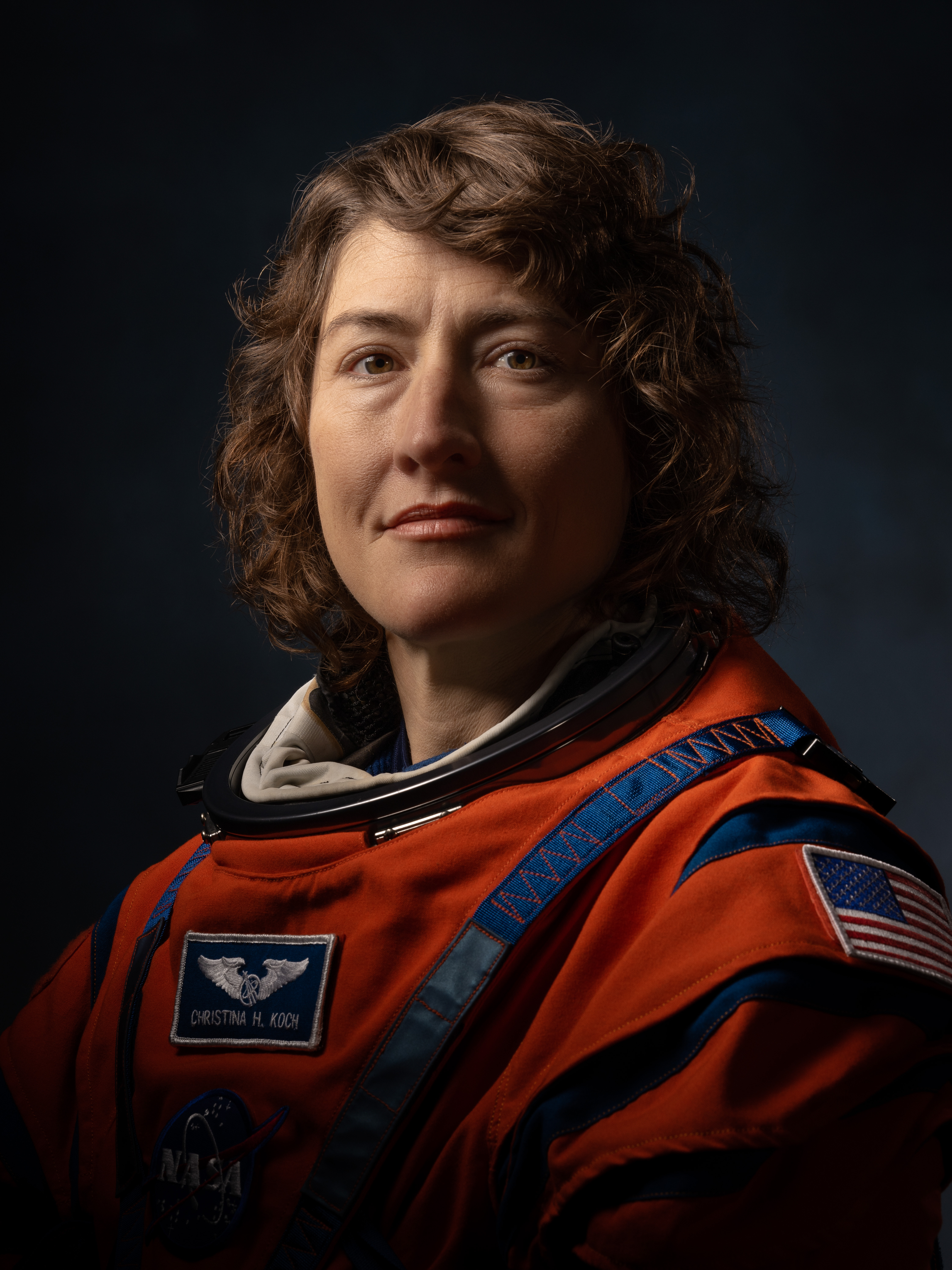
Christina Koch: I am a huge fan of Houston We Have a Podcast. I listen to it a lot. I have a, a commute and it definitely gives me a lot of great information and keeps me entertained on that.
Host: We brag about you, like, talk, even when you were in orbit, you talked about it.
Christina Koch: Yep.
Host: Like you were like, “oh, I love listening to you guys.” You’re just like, it means the world to us.
Christina Koch: Awesome.
Host: It really does.
Christina Koch: Well, when I was in orbit, this thing got started, it was called Artemis. I didn’t even know how to pronounce it, I had to look that up.
Host: Really?
Christina Koch: And the first things I ever learned about it were from your podcast.
Host: Oh, how about that?
Christina Koch: Yep.
Host: [Laughter] Very cool. I am ashamed that we didn’t get you in the studio after your expedition.
Christina Koch: Oh. Couple things were going on when I got back, so…
Host: Yeah, yeah. But it was, you spent quite a lot of time on the International Space Station, and I, I didn’t really get a chance to ask you about it, but a lot of people did. But you reflect on that time, and it, it is just unbelievable. You were, like, that was a long time to spend on the ISS. When you think back on it, what’s some of the first things that come to mind?
Christina Koch: The main thing that comes to mind is just what an honor it was to be on board for that long, and to live and work there through multiple crews. I didn’t have anyone on board that I started my mission with end my mission with. So I actually was there with a whole entirely new group of people, and that’s not that common. Other long-duration flyers usually have another crewmate that has at least been there from the beginning, and there’s some continuity there. But just seeing how many different ways there are to live and work in space and how different groups of people go about doing that, and I think the big thing, my biggest takeaway from my time on board the space station was teamwork and humility. That it really just takes a huge group of people to do what we do, and that you need your crewmates, you need your team on the ground, and that can take a lot of different shapes and forms. But being a part of that through kind of different eras and generations was awesome.
Host: You know, this is a theme that we’ve been hearing with talking with all the Artemis I astronauts, is this idea of team and it’s, you know, it’s — I said Artemis I, I meant Artemis II — but it’s not even true for just Artemis II. This is just, this is just a central thing to being a successful astronaut is, you’re not going to go alone. That’s not a thing anymore, right? You’re going, we’re going to the Moon together, we’re going, we, we’re on the space station together. You absolutely have to have a very strong team.
Christina Koch: Yep, absolutely. And it starts with your training team believing in you, and it goes all the way out through the team that’s on the ground when you launch and land and…
Host: Yeah.
Christina Koch:…that carries you through every day.
Host: And I think what’s interesting about your mission is you, you just, you just mentioned this is you, you don’t, you, you form these bonds with, I think on the ground and you’re training with, with one crew, but then with one, you know, with this cadre of astronauts, but then you have to sort of switch that. I wonder if that was, I could see it about a couple different ways. It could be like a positive experience, you get like, oh, fresh new faces, welcome, you know, or if it’s like you kind of miss that crew. Maybe it’s a little bit of both?
Christina Koch: Yeah, I would agree completely. It’s definitely a little bit of both. And in my position, I went into a leadership role at the time of a crew change, and so a new crew came up and I was leading with the mentality of a previous crew. And learning to shift that was a huge lesson for me in flexibility. And like I said before, just learning there’s a lot of different ways to be successful and that a team dynamic is, is important and making sure that people are working, how, how they want to work and what makes sense for them and what makes sense for a team culture, a climate, and, and making sure that’s all taken to account. It was a cool experience.
Host: Well, now you’re going to take all of those experiences of what it takes to work successfully with a crew of, of astronauts and take it to the Moon, in a much smaller space. First of all, congratulations; this is awesome to hear that you are going to be going to the Moon. I wonder when you heard the news, what was your reaction?
Christina Koch: Well, thank you very much; it’s definitely an honor. When I heard the news I was floored, honored, I couldn’t speak for a little bit. It felt a lot like the day I learned I was going to become an astronaut. It took a while for the news to sink in and what it would really mean. And I think overwhelmingly, though, my desire was to make my crewmates proud and make my, my fellow astronauts proud and really everyone, because I truly think that this mission is for everyone, really for all of humanity. And so that is kind of the overarching feeling that settled in after originally hearing the news.
Host: Unbelievable. I want to take it back, though, because it’s been a while since we had you on the podcast. I feel bad that it wasn’t me; I forget what came up when we last had you on, but we had you on before your expedition…
Christina Koch: Yep.
Host:…before you launched. And so just to sort of reintroduce you to our audience: grew up in Michigan and I wonder if, if there was some maybe part of your childhood or something that maybe you caught the space bug or, or had, or had some idea that this is, this is the direction that I want to go?
Christina Koch: Yep. I was born in Michigan, I spent summers there, and I actually grew up though in North Carolina for the most part. Yep. But I do identify with both of them as my home state, for sure, I learned different things in both places. And I’m one of those people that can’t remember a time when I didn’t want to be an astronaut. Everyone who knows me, right down to my kindergarten teacher, remembers me saying I wanted to be an astronaut. I think it goes back to always loving things that made me feel small. I love looking at the night sky. I grew up near the ocean. I loved the beach, the water, sailing on the ocean, things that made me contemplate my place in the universe, even as a kid. And going down to Florida on a family trip to actually Disney World, and then taking a side trip over to Kennedy Space Center, just sealed the deal. I, I spent all this time in the gift shop, came back with posters and everything else, and I just kind of moved into this identity of being a space nerd and always have been.
Host: That’s amazing. And it was engineering that you pursued?
Christina Koch: That’s right.
Host: And so what, of all the ways that you can pursue being an astronaut, why engineering?
Christina Koch: Well, I, I wasn’t sure exactly the road I was going to take. I love building things and making things, I also really love theoretical things and so I did also major in physics. But I knew I was kind of a maker, and I used to hang out in the shed with my dad. We would fix things, make things, build things, woodworking, working on cars, motorcycles. And I just loved that time: we called it shed heaven. And so eventually the ISS became another version of shed heaven. But yeah, tinkering and learning how things work was always something I really enjoyed. And it’s funny because I used to go to Space Camp, and we used to learn the ways that you should become an astronaut, all the little things that you should do, the way, you know, the different paths, becoming a pilot and things like that. And I remember one day in that literal class called “How to Become an Astronaut,” when they were listing things on the board of what you should do, and I looked at the list and I looked around, everyone’s copying everything down cause we all want to be astronauts, and I said, I’m not going to live my life by a checklist that’s on a board. I’m going to do what I’m really passionate about, and later in life if I look back and I see that maybe I’ve become some, someone that I could make the case for being a part of this team and being able to contribute, then I would do it. But I held it in such high regard, I couldn’t just change what I was passionate about to pursue it. It was too lofty for that for me. And so, since engineering was what I loved and what I was gravitated towards, that’s where I went. And I, I never did learn to fly prior to joining the Astronaut Corps and some of the other things.
Host: I, I identify so strongly with that I, I, you made me think about in college, I was trying to figure out what I was going to do, too. And there was a moment where I was applying for several different internships because I knew that was a thing you had to do. And I was going to business school at the time, I was having this, I was at this existential crisis of do I even want to be in in business, right?
Christina Koch: Yeah.
Host: And I remember sitting down and I was, I, I got through the interview stages for an insurance company, and they asked me as part of the interview, they asked me this question. They said, “do you like money?” And I was like, I paused. I paused, because I was like, is that why I’m doing this? Am I, am I doing it? Like I, and then I started spiraling, am I doing it only for money or am I like, do I want to find something that I can get behind, that I believe in? And it just, it was a moment within a question that just shifted me. Like, I need to refocus. I need to make sure that whatever I’m going to do, I’m going to love.
Christina Koch: Wow; that’s awesome. And that’s the exact heart of all the advice that I give to people that I speak to.
Host: Yeah.
Christina Koch: Number one is do something that you love.
Host: Yeah.
Christina Koch: That can be hard to figure out what that is, but…
Host: Yeah.
Christina Koch:…but oftentimes going back to what you loved as a kid can really help lead you in the right direction.
Host: Because I think, you know, there, there is a certain thing with doing what you love, but I think there’s also this sense that you have to kind of push yourself out of your comfort zone too…
Christina Koch: Absolutely.
Host:…because I sometimes what you love will present some challenges and you’re going to have some things along the way that’s just like, oh, I’m not meant for this or, you know, this is way too hard. But I’m sure you encountered something like that where you just had a, you, it was a challenge but you’re just like, I have this goal and this, if this is what it takes to meet this goal, I’m going to, I’m going to do it.
Christina Koch: You nailed it. After #1 and 1A that I tell people, do what, do what you’re passionate about, and then the next thing I say is do what scares you. And you get out of and contribute the most to the world when you do the things that you think are just outside of your reach, or very far outside of your reach. And for me, one of those first things, you know, besides getting, pursuing the engineering in school, which was definitely a challenge, but the big challenge was I took a job wintering over at the South Pole as a cryogenics technician. I had never been a cryogenics technician before, and the previous three or four cryogenics technicians they had had hadn’t been successful in preserving the supply of cryogenics, which is needed for the science of the South Pole over the long winter. And so the, taking that on and also knowing that once you sign onto that you can’t necessarily leave in the middle of it, that was a huge challenge. And that really was pivotal for me in finding that love of taking on things that you’re not sure you can do.
Host: It’s a good, even, even today, Antarctica is an analog for extreme environments. It kind of puts you in this mindset that maybe if you think about being an astronaut, you don’t really fully appreciate until you do something maybe like that. And I know maybe that kind of helped you to either to set yourself up for success for your expeditions on ISS, or I mean that experience of living and, and operating in an extreme environment translates very nicely to spaceflight.
Christina Koch: Absolutely. Some of the things that I learned for getting through the winter at Antarctica, I 100% applied in some of the exact same ways to my 11 months on board the space station.
Host: Now, your training for the space station, when you, when you finally like got, actually let me back up; the call. This is, this is always a cool moment to talk about, when you got that call. You know, you’ve said you would, been dreaming about being an astronaut since being a kid, and then there’s this moment where somebody over the phone or you know, is going to tell you that your, your dream is about to come true. I’m sure that’s something that sticks, stuck with you.
Christina Koch: Definitely. I was living in American Samoa at the time, working in another really remote science base similar to the job that I had at the South Pole. And so, the call came in very, very early because of the time change, and it woke me up. And I was so certain that the call was going to be the bad news call that I almost started thanking them for their time, apologize, not really apologizing but you know, kind of being deferential before they even had a chance to talk. And they actually interrupted me, and it was Janet Kavandi and she said, no, no, I want you to come join our team. And it just, I completely was dumbfounded, couldn’t speak. And she said, “hello?” And so, after I, I would manage to pull myself together and continue the conversation, it was, it was, it was incredible. And I went ahead and went to work that day, came home, and on the way back I wasn’t sure it really happened. I, I was thinking, was that a dream? I got woken up, and luckily I had jotted down some notes and I, I ran back and looked at the notepad and there it was: it had really happened and, yeah, my life’s never been the same ever since.
Host: In a positive way, I mean…
Christina Koch: Absolutely.
Host:…like fulfilling, living the dream. And you got to spend so much time on the International Space Station. I know that was some time ago. What have you been up to since?
Christina Koch: Yeah, it was. I actually just celebrated my four-year launch anniversary and about a month before that my three-year landing anniversary. So it’s, it’s been a time of reflection, for sure.
Host: Yeah.
Christina Koch: And since I’ve been back I’ve been really lucky. I had one of the most incredible and unexpected opportunities ever, which was to go into a leadership role in the Astronaut Office. I got to be the branch chief of what we call the Assigned Crew Branch, which means that I got to lead a group of around 40 mostly astronauts who were either in space, training for space, or recently returned from space, and then the support staff that makes all that happen, the schedulers and, and people that provide provisions. So anything having to do with, no kidding, humans going to space, I got to, to lead, and I discovered just that, leadership. I hadn’t done that type of work before with, in that kind, on that kind of a scale, and it completely just blew me away how much I enjoyed it. I have always been completely technical, nerdy person; electrical engineering and physics were my majors; all I wanted to do was be at a lab bench, tinkering. And this was even better than that. Developing people, being able to contribute to people’s success — trying to, anyway; hopefully I did — removing barriers; that was awesome. And that led me to think about other, you know, realms, leadership in other ways. And I ended up taking a rotation working as a technical assistant to our center director, who is Vanessa Wyche right now. And that was a year-long rotation that is nearly complete. And it has been an amazing learning opportunity. The things I’ve been able to see, learn about how a center runs, the governance of NASA, just everything that goes into leadership at that type of a level. It has just been such a privilege.
Host: And in sort of an eye-opening way, it sounds like, because this is, like you said, you, you talked about challenging yourself a little bit earlier, but in a way, this was a way to kind of immerse yourself in what it takes to be a successful leader, to run a successful team. Pulling some of the lessons over this time where you were in these leadership roles, what are some of the key things about operating a successful team, being a good leader, what are those qualities that stand out to you?
Christina Koch: So many. I often think how great it was to, that I was even able to be in the room with the Johnson Space Center senior staff, who are all completely dedicated individuals who care so much about human spaceflight and being successful in making their people successful, and having successful missions. So yeah, just being in the room with them in the, some of the strategy sessions and things like that was awesome, watching them lead their teams, watching the center directors lead. I think, in terms of lessons, it’s, it’s hard to pick just one. A big one I would have to say is, what differentiates the leaders is, I think a willingness to take on things that not everyone is willing to, to, you know, the metaphor of being in the, the arena, to put yourself out there and to be willing to make mistakes that are on display, and to take risks; to be willing to approach things with curiosity and take, take and give feedback. I think, you know, some of the, the small skills that are actually the huge skills are things like not shying away from difficult conversations, not shying away from, from hearing things that you need to hear to improve. So those are just, you know, a couple examples that I can think of. But overall, just, I’ll take away so much and hopefully take back both to the Astronaut Office and on this mission.
Host: And that’s where I was sort of leading with that was you, you are the last of the crew that I am talking to as part of this podcast. And I love this theme of, of teamwork and what it takes to be successful team because I look at the four astronauts that I got to talk to today: gosh, you guys are awesome. And I think not only that, but what’s great is everybody has the same exact mentality as you of, of, and everybody has been saying these same things that about the teamwork and, and about, you know, just, just putting everything you have into a successful team, what it takes, you know, that mix of that seriousness, that fun, that authority, but also listening to the expertise of, of your fellow astronauts. And I, I wonder if you’ve had that same reaction. You look upon the Artemis II astronauts who you get to fly with, Reid Wiseman, Victor Glover, Jeremy Hansen; I mean this, these are like, I, I would be so excited, I wonder if you have the same reaction, what are your reactions to flying with particularly these folks?
Christina Koch: Oh wow. Well, first of all, thank you for that. It is amazing to be a part of this group. The three people I get to fly with are my heroes. Victor Glover is a classmate, so I consider him one of my best life friends. And I’ve had the chance to work very closely with the other two as well, or, and, you know, as a mission specialist I, I see a role developing where I get to focus on another skill that I think is just as important as leadership, and that is followership. And you would not believe that followership is actually stressed as a expeditionary skill as much as leadership in the Astronaut Office. And it is so very important. And even going back to the rotation that we just talked about where I was supporting our center director, I learned a lot about followership because my goal in life was to make, to contribute in whatever way I could to someone else’s success as a leader. And knowing when to step in to either offer something or to anticipate what someone might need and to provide it before they ask, and to be an active follower means you’re not checked out of the decisions that need to be made, but you provide support to, so that, you know, the commander can make those decisions, and you know that they are something that everyone can believe in. You know that nothing’s been left on the table unsaid. And I think some of those skills I hope to bring in this role, which in turn is a way of leading in some ways. So I hope that I can, I can sway things about kind of our, our culture as a crew and, and to do that as a mission specialist who can find a niche, technical and, and in terms of just how we get along, I think is something that I’m looking forward to.
Host: Awesome. Now, ahead of you, you’re going to have to obviously have a lot of training from the technical side. You have to learn about…
Christina Koch: Can’t wait.
Host:…yeah, the Orion, you have to, they have to learn about the mission profile, you have to go through all these emergency procedures. There’s going to be this heavy component of learning. But I think there’s also going to be this heavy component of bonding. And I think that’s going to be, I, I, something that’s going to be just as powerful is that you’re going to be spending so much time together, but you have to balance that. You have to, everybody has to, you know, you talked about the followership, it’s interesting hearing you say that because, you know, you, you understand, especially in your leadership position, you’ve assumed that leadership position, you know sort of the roles of what it takes to be a good team and part of that good team is that followership and you are perfectly willing to assume that, right, and, but, but understanding those roles and developing that relationship, you’re going to have a lot of time and it’s just, it’s got to be so exciting to be looking forward to that.
Christina Koch: It is. And it’s, it’s funny because as a technical geek, I cannot wait to learn the systems of this vehicle. I cannot even tell you how excited I am about that. I loved learning the spacecraft of my last mission. Absolutely loved it. I couldn’t get enough of the engineering that went into it, the operational stuff that comes out of that and how that meshes together. And amazingly, even more than that, I am looking forward to that crew bonding and how we will all fit together. I think that a well-bonded crew with good empathy, communication and climate is 100% the most important thing for mission success. To be able to feel comfortable asking for help, speaking up when you need to, and knowing that you are always going to be judged on, yes, your knowledge, but also by what you offer and aren’t afraid to admit you may not know if you should…if that makes sense. So…
Host: Makes total sense.
Christina Koch:…keeping something to yourself because you’re unsure of being able to share it with a crewmate, I think, is one of the biggest risks to a successful mission. And that’s why I look forward to working with this crew, because I, I know we’re going to operate with that understanding.
Host: It’s going to be fantastic. Now, kind of wanted to end on this note. Going back to you saying that you’ve always wanted to be an astronaut since you were a little girl. And of course, when you imagine yourself as an astronaut, always wanted to be yourself as an astronaut, I wonder if you’ve imagined yourself on a mission to the Moon; if you’ve went back and, you know, watched all the clips of Apollo, and said, what, what would it be like if I was there? And now, you get to actually experience that. You get, you, you’re thinking about seeing the Earth get smaller as you go, as you go farther away, you are going to see the Moon closer than you’ve ever thought of before. I wonder if you’ve actually had time to process some of that. I mean, it’s one thing to imagine it as a, as a girl, but now you know, you know the Artemis II mission profile, you have a sense of exactly what you’re going to see, you following along for Artemis I, you have a no, you have a, a kind of a sense of what to expect…if you’ve kind of sat with that and been like, oh my gosh, that’s going to be me.
Christina Koch: Well, you’re exactly right that I sat with that a lot when I was dreaming of becoming an astronaut. One of those posters I bought at Kennedy Space Center was the famous Earthrise picture that was taken, I believe on Apollo 8, which was another mission just around the Moon. And so when I think back to the fact that that iconic picture that I stared at so, for, for years as a little girl is now the mission that I get to go on, is very hard to fully absorb. But yes, it is different now when I look at the Moon. I stop and I look up at it and I really look at it and I think about the fact that we’re going there. And not only that I’m going there, that we are going there and that people I know are going to walk on the Moon. And that is really what feels profound to me. The fact that I get to be a part of it is just almost beyond, beyond, you know, being able to fully appreciate.
Host: Unbelievable. I absolutely want to end on that note. Christina Koch, it has been an absolute pleasure to get to have this moment with you to talk about this upcoming mission. Congratulations, and wishing you all the best on the training coming up here. So it was wonderful to get to talk to you.
Christina Koch: Thank you so much. It was great talking to you, too.
Host: Last but not least, we have Canadian Space Agency astronaut Jeremy Hansen, also an Artemis II mission specialist. Born in London, Ontario, Jeremy was an avid flyer even from childhood, beginning his flight experience at age 12. He joined the Canadian armed forces and received a bachelor’s of space science and master’s in physics from the Royal Military College of Canada in Ontario. He spent time as a fighter pilot before being selected in 2009 as a Canadian Space Agency astronaut. He completed his astronaut candidate training and spent several years in various roles at CSA and NASA, including leading the 2017 astronaut class in training, and being a part of the team to design spacewalks for the Alpha Magnetic Spectrometer repair and upgrades. Artemis II will be his first trip to space. A humble and capable person; here’s Jeremy Hansen.
Host: Jeremy Hansen, thank you so much for coming on Houston We have a podcast.
Jeremy Hansen: It’s my pleasure.
Host: Really cool news: you’re going to be going to the Moon. Congratulations, sir.
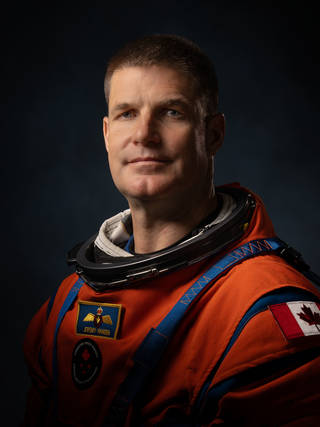
Jeremy Hansen: Oh, thank you. It’s crazy to think about. I’m actually going to fly to the Moon and I, I’m really super-pumped about it. A little bit hard to believe and definitely humbled by the opportunity as well.
Host: Yeah, I think, it’s still sort of sinking in. I get the opportunity to talk to you when it’s still very fresh and so you’re not the first person I got, I talked to today that the first thing they did was sigh when I said, when I, when I said, hey, congratulations. You’re like, oh man. I think maybe it’s just the gravity of the whole thing, of just what you’re about to do, that maybe you’re still processing?
Jeremy Hansen: Yeah, absolutely. You know, for me, it’s not lost on me how big a deal this is. And not, not because of me as an individual, but because of the team. This is a credible team that enables human space exploration. And I’ve just been, I guess, almost gifted, really, this opportunity to go fly out, explore the Moon, and come back. And it’s a lifelong dream for me, but more than that it’s an opportunity to be part of something huge that is inspiring for an extraordinarily large group of people that are going to come together and make something that is almost impossible possible.
Host: That’s incredible. And you said it’s been a lifelong dream, so let’s, let’s go back, let’s get to know Jeremy Hansen. Where you, growing up in Canada, what was life like, and take us through the path that sort of got you to being inspired by human spaceflight and wanting to be a part of it.
Jeremy Hansen: Yeah. I grew up on a farm in rural Ontario, outside of London, Ontario. I was an only child so I spent a lot of time, you know, imagining, you know, imaginary play, going on adventures. And I had this passion for airplanes, and I, we had a set of encyclopedias at home, which was like, before, I’d have to kind of quantify this for, for young listeners, but before the Internet we had books that were like the internet that sat on your shelf, and encyclopedia A was airplanes, I spent a lot of time thumbing through it looking at the pictures of airplanes. And then one day I happened to cross “Armstrong,” just by chance. I wasn’t looking for it, I just flipped to the wrong page. I came across Armstrong, first human to walk in the Moon. There was a picture there, and that page of that book is still burnt in my brain. Like it really caught my attention, and I can still see it in my mind right now. And I thought, wow, that is incredible: humans went to the Moon, explored it, and came back. So right away I changed my tree ship into a space, my treehouse into a spaceship, I created all these dials and controls, I had circuit breakers for switches in there, I drew stuff on the walls, and I was going on space, space missions. I was exploring space as a kid, in my imagination. And now, and that had just inspired me. You know, it was like I eventually realized that, hey, I could become a space explorer, that is possible as a young Canadian, I was seeing examples of Canadians doing this. And so, I started to follow that path, and here I am today.
Host: This was the Canadians that were flying shuttle; you thought, let me just do what, what did they do to become an astronaut, and so that happened to be become a fighter pilot or a jet pilot.
Jeremy Hansen: Yeah. And when I look back at how that happened, you know, it’s really a unique, it’s a perspective I, I share with youth a lot because I think it’s, I didn’t know I was doing it, but unintentionally I had set a goal, I wanted to explore space. And then I did something really important. I just kind of fell backwards into it. I didn’t really realize I needed to do it, but I told people I wanted to be a space explorer, wanted to be an astronaut. And then other people are the ones that enabled me to, to kind of find a path to do it. You know, as teachers are like, oh, maybe this kid’s motivated, maybe I can leverage that motivation to push him a little further in school? I had some really great teachers. My father told me about the Air Cadet program, which was a really cool youth program in Canada and they’ll teach you how to fly. And he is like, hey, if you’re interested in planes maybe you want to fly and join Air Cadets? But Air Cadets did so much more for me than teach me to fly: they taught me self-confidence, they taught me to be a leader, they taught me what it is to be a good Canadian citizen, and they prepared me to join the Royal Canadian Air Force, become a fighter pilot, fly the CF-18, and ultimately all of those experiences and all of those people investing in me is what made me ready, made it possible for me to have a credible application to be in the right place with the right skills to become an astronaut.
Host: Amazing. Yeah. So those interpersonal skills, let me focus on those for a second. Just, you know, those, I think people, when they think about becoming an astronaut, they think I got to study hard, I got to know math, you know, and you, you know, you have a background in physics so you’re definitely good at math. But the interpersonal stuff plays, I think a bigger role than I think is orig, like people originally think, because you’re not just a solo space explorer on a space capsule yourself. You have to get along with a team and that’s become ever more clear with International Space Station missions. So just honing those skills, I feel like, is something that maybe helped you to become an astronaut. When you did the interview, people could tell, you know, if I had to be stuck in a tin can with this guy, I think I could do it.
Jeremy Hansen: Yeah. I really like that you’ve honed in on that. I think it’s super-important. I, you know, I share with, with, with youth a lot, you know, there are kind of three things you need. You do need academics, you know, you are going to have to do your best in school. You are going to have what I call operational skills: you’re going to have to push yourself, you know, you can’t just sit at home and play video games and be ready to be an astronaut, you got to have a diverse set of skills. You’re going to have to get out there and do things that are a bit scary for you a little bit, you know, you have to, you will have to challenge yourself to be an astronaut. But then the, the last one, the big one, is you’re going to have to be a good team player. You’re going to have to be able to take care of others, want, you’re going want, have to want to take care of others. And you’re right, nobody wants to be trapped in a tin can with, you know, someone who doesn’t have empathy, can’t put themselves in your shoes for a moment. And those are skills that we talk about a lot in the Astronaut Corps because they are incredibly important. Can you do it without it? You could, but can you do better? If you work well as a team, you can do so much better.
Host: Tell me about when you finally thought, I am ready. This open application is out, they’re accepting Canadian astronauts, I’m going to see if I can throw my name in the hat, and then following that, the call when you got it.
Jeremy Hansen: Yeah. So I mean anybody that can do math understands that your odds are being selected to be an astronaut, at least in my timeframe, are low. And, and then you, you, you do apply, of course — you can’t have it if you don’t ask for it, you have to go for it.
Host: Yeah.
Jeremy Hansen: I did apply, but I had very low expectations. I was 100% confident I could do the job, but I had very low expectations that I would be accepted, mostly just statistically, but also meeting the other applicants. I’m like, wow, these are extraordinary people. I just really don’t think I’m going to stand out and they’re going to pick me. Even though I knew I could do the job. And so, I guess I was, you know, almost pleasantly surprised in the end. I was like, wow! I mean, they’re going to give me a shot at this and I’m really going to have to bring my A game. I’m really going to have to step up and fill these big shoes that they’ve given me to wear. But now that, you know, I look back upon it, there’s this big team of people behind me, Canadian Space Agency, here at NASA, people that are helping me to fill those shoes. I’m not doing it alone.
Host: Yeah, definitely that team component is, is huge. You finally got selected though and started with your astronaut training. Anything kind of stick out in that time that you were training as an astronaut candidate?
Jeremy Hansen: Yeah, my, my, it was kind of like a two-year period when you first get here to the Johnson Space Center, we call it Astronaut Candidate Training. And it’s just a really tremendous experience. You’re trying all these new things for the first time. You’re learning to do, you know, space robotics, to fly Canadarm 2, you are learning how to do spacewalks. We’re working on those expeditionary skills, kind of those team skills that you’re talking about. So we’re putting that, that class of astronauts in some really tough and challenging situations together, like backpacking expeditions out in the wilderness, you know, things that don’t necessarily look like spaceflight but there are a lot of similarities to, you know, what’s required for a team of astronauts. But I’ll tell you about that two-year period, you know, my richest memory about it is, you know, not the individual experiences but the camaraderie. I love that class, and I love the whole Astronaut Corps. You know, now after over 13 years at the Johnson Space Center, you know, I love the entire Astronaut Corps. I love working with them. But that class, that’s, that’s special to me. And, and I’m going to fly to the Moon with one of my classmates, so that’s, you know, Reid, Reid Wiseman and I are classmates, and so that’s pretty special.
Host: That’s awesome. Full circle…around the Moon, but first full circle.
Jeremy Hansen: Yeah.
Host: So let’s see. I want to focus on your NASA career a little bit, or your time at NASA, because you were a huge part of the team for many different aspects. You know, you haven’t, this will be your first spaceflight, which of course, if you think about, you know, being the first one going to the Moon, that’s not bad. But you spent a lot of time at NASA helping the team out. And the one that sticks out to me was the Alpha Magnetic Spectrometer; huge undertaking from the team. I got to be a part of it myself in some capacity learning to do the commentary for it, so I had to absorb, absorb, absorb. But you had to create it. You had to work on the spacewalks, figure out the techniques, and do it with a very large team. That must have been, I mean, to me it feels like it would be a defining career moment, but tell me about your experience with the Alpha Magnetic Spectrometer.
Jeremy Hansen: Yeah, it does stand out for me. As you know, I don’t know if I would call it defining, but it is one of those, it is one of those experiences that taught me a lot. And, you know, what’s, I think, when you’re a little bit scared of something, you know, those are, that’s what really focuses you. That, and we all knew, all of us that were on that team that really understood what needed to be done, we knew that we could, we could mess it up. We knew that we could break this scientific, this amazing scientific instrument that is literally exploring the universe from the International Space Station, we could make it a paperweight if we got it wrong. And we had time, you know, we had lots of resources available, we had lots of amazing minds working on it. And we also knew we could do it, but we also knew we couldn’t, we couldn’t be lackadaisical about it. We had to be really focused. And even after we had a plan, and it was a good plan and we had great confidence in the plan, we knew that there was no room for human error in a few of the points. And so we, we had put in place some protections to try to prevent them, but at the end of the day we still had question marks over our head. And I love that. I mean, that is exploration, that is pushing the limits. And so when teams know that there could be a very public failure, that’s where you see the real people, see what they’re really capable of. And I’m so proud of that team. You know, I’m really proud to be a part of that team. I’m really proud of what that team accomplished.
Host: Do you think maybe that experience or maybe others contributed to your preparedness for Artemis II, maybe through the working with teams, solving complex problems, there might be some, some components here that you’re going to pull whenever you’re actually flying for those tenish days?
Jeremy Hansen: Yeah, for sure. And you know, everything that I’ve experienced, certainly the, the Alpha Magnetic Spectrometer spacewalks, working on that team, definitely I’ll take a lot of that with me on this mission, it definitely prepared me for that. But it’s, it’s really the combination of all the things and we’re working with the team over so many years. This team is a known quantity for me, I’ve got absolute faith in them. And I’m a known, known quantity for the team. And I think that’s, there’s a lot of benefit in that.
Host: Of, you know, if you take a look at who’s on the Astronaut Corps now, this is, this is quite a cadre. The, the four of you are, you know, I, I feel like there’s a lot of experience, there’s a lot of, there’s a lot of interesting skills and talents that can be put into this 10-day mission. I wonder just sort of your reaction to finding out who you’re going to be flying with and thinking about these are the folks that I’m going to be in a tin can with for, for ten days. And how do you feel like?
Jeremy Hansen: Yeah, I think you probably get this from all of us. You know, it’s, it’s, it’s definitely important for us to, to communicate accurately that, you know, we’re, we’re a, a corps of astronauts, a corps of talented people that we all, we trust, and there really wouldn’t have been any, you know, anybody could have been selected I would have been excited to fly with them. But when I do look at this, this team in particular, I, it’s exactly that, that I’m, like, I’m thrilled to fly with them. Like, this isn’t like, oh, there’s no hesitation. I trust these people completely. I respect them as human beings. I consider them my friends. And so, I, I just feel so lucky to be flying to the Moon with a group of people like this.
Host: Every astronaut before you that has flown to the Moon has been an American, and this sort of builds off of that legacy, but it has this new component of going together, this international component. And I think if you look at the crew, I think you kind of represent that as the Canadian and it’s sort of the first step of many, of including international partners in exploring the cosmos. Thinking about that responsibility, how do you feel on approaching that, in terms of what it means for you representing Canada, representing international collaboration for Artemis?
Jeremy Hansen: Well, I was feeling fine about it until you’ve framed it that way. [Laughter]
Host: [Laughter] My bad.
Jeremy Hansen: You know, for me, I think the international collaboration is, is, is the sweetest aspect of human space exploration. The fact that we’ve gotten to this point where we, you know, and in truth, you know, the United States could do it on its own. This is, this is an active choice to involve an international partnership in building the International Space Station and going back to the Moon and going onto Mars and doing it together, it’s an intentional decision. I think the United States should be applauded for that decision. In my mind, that is the essence of leadership. That is the definition of leadership, where you look out and you realize that if you curate a team of people that can work together and do incredible things, you will do more. And so that, I think, you know, first off, I, I always kind of point back to just kind of congratulate the United States in having that kind of bold vision. I think it’s amazing. And I’m, as a Canadian, I’m very appreciative of that leadership. And then I think the next aspect of it that really resonates with me is, you know, as a Canadian astronaut I’ve been very fortunate to travel across all of Canada, see our industry, see our engineers, our scientists, our academics, our thinkers. And they’re incredible. And the fact that the U.S. is providing this opportunity allows them to shine, lifts, puts them in a place where it lifts them up to make some incredible contributions. And in, in this example, you know, I’m, I’m not flying on Artemis II for any other reason than the fact that Canadians have created this opportunity for me. They have risen to the challenge. They’ve taken on some really big challenges. We have a slot in Artemis II because we committed to, as a country, committed to building Canadarm 3 for the Gateway, the, the space station around the Moon. And this is not just like a carbon copy of Canadarm 2, this is something completely different. This is a much bigger challenge to do space robotics in deep space with the latency, the delay in communication between the Earth and the Moon. This is a complete redo of space robotics. And so it’s a big deal. It’s a big challenge. And I’m proud of Canada for stepping forward, for bringing real value once again to the partnership, and showing that there, you know, it is worthwhile to put in the effort to do this as an international collaboration.
Host: Powerful words. And it kind of makes you pull back and just realize just how expansive Artemis is. You know, you, we talk about it a lot from a national perspective, we talk about it a lot for, from, you know, we, the American component of it, of, of course. But bringing the world together to, to create this, I mean, we have components of Orion itself built in Europe, and you talked about the Gateway, which is going to be a critical component to sustained lunar presence, especially for surface missions. And you’re right, it’s, it’s, it’s more expansive. If you recognize it, I mean, like, it’s almost humbling to recognize that you, you were selected, right, but there’s a lot that you have to represent, there’s a lot of people, there’s a lot of components that actually make Artemis a reality, make Artemis what it is.
Jeremy Hansen: Yeah, absolutely. Truly is humbling. You know, when you, when you, you look at it from that perspective, it absolutely is. And that’s why the focus just has to go back on, you know, on the, on the broader team that makes this possible. And you, we will, we will focus on, you know, the team, the crew of four, and the, you know, the, the mission control team, we will focus on, you know, the actual flight of the capsule, buying down that risk, setting up the training programs for the future, preparing ourselves to go back and walk on the Moon. You know, we will very much focus on that, and that’ll be a lot for us to chew. But the Artemis program is much, much bigger than just flying one mission out around the Moon. It is about doing something for humanity. I,I listened to President Biden, he made some remarks recently in Canada in front of all of Parliament, and he was talking about possibilities. He was, he was talking about space exploration, our, our joint endeavors, two countries working together to explore space, but he was talking about possibilities. And that’s what Artemis II is, it is reminding us that we can do some incredible things if we work together; if we, we set goals that, you know, not just because you want to accomplish them, actually set goals are going to bring value back to humanity. That’s what we’re doing. I love it.
Host: Think it’s, it’s important to recognize that Artemis II is a test flight, it’s a flight test. It’s, what you’re doing is you are putting yours, you talk about buying down risk, right, but you are just making sure that Orion all the capabilities that we thought could go into this spacecraft that we’ve tested on the ground, that we’ve put through the gauntlet on Artemis I, that this thing is ready for humans. And, you know, I kind of makes me think, why, why do we do this? Why do we continue to push ourselves? Why do we continue to, you know, do these sort of risky things? You talked about a payoff, but in your perspective what is, what is the reason that we’re doing this, that we’re exploring?
Jeremy Hansen: Yeah. For me, it comes down to taking on challenges and sort of curating a system amongst humanity to work on these big challenges together. I, I don’t think anyone that pays attention, you know, has some concerns about some of the challenges that humanity faces on this planet today. And they are global challenges, and they require global solutions. And Artemis is, you know, we’re making this a global effort, and there’s room in it to expand in the future. You know, there’s room for others to see themselves in the future part of the Artemis program and to rise up to the challenge. And that will allow us to, you know, set an even greater example to exercise this coming together of the planet, to, to work on things that affect all of us. That’s what exploration really is about in my mind. And you have to take it stepwise. We always have. And the next big thing in front of us is sending humans back to the Moon in a sustainable manner, a sustained presence on the lunar surface, and then heading out onto Mars. And doing that as an international collaboration. That’s really what’s most important here.
Host: Jeremy, this was awesome to get to talk to you and kind of pull on your brain for just a little bit. And I absolutely appreciate it. You are going to be very popular in Canada for a while. There’s going to be a lot of folks that are going to want to talk to you, I think around the world too, but to have the chance to sit down and, and get to have this chat with you was, was pretty special. So thank you. Congratulations for, for your selection on Artemis II and best of luck to you.
Jeremy Hansen: Yeah, thank you. I appreciate that.
[Music]
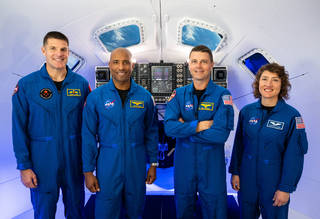
Host: Hey, thanks for sticking around. I had a blast, and it was such a privilege to get to talk to these astronauts. I hope you’re as inspired and excited about Artemis as I am. If you want to check out more of our episodes, we’re on NASA.gov/podcasts. If you want to learn more about Artemis specifically, you can go to NASA.gov/Artemis. There’s actually a whole page on just Artemis II, and you can follow along on the mission there. If you want to talk to us, though, at Houston We Have a Podcast, we’re on the Johnson Space Center pages of Facebook, Twitter, and Instagram. Just use the hashtag #AskNASA on your favorite platform to submit an idea or ask a question for us, just make sure to mention is for us at Houston We Have a Podcast. These interviews were recorded in March 2023. Thanks to Will Flato, Pat Ryan, Heidi Lavelle, Belinda Pulido, and Jaden Jennings for their work in the podcast as always. And of course, thanks to the Artemis II astronauts, Reid Wiseman, Victor Glover, Christina Koch, and Jeremy Hansen for dedicating some time to chat. Give us a rating and feedback on whatever platform you’re listening to us on and tell us what you think of our podcast. We’ll be back next week.

